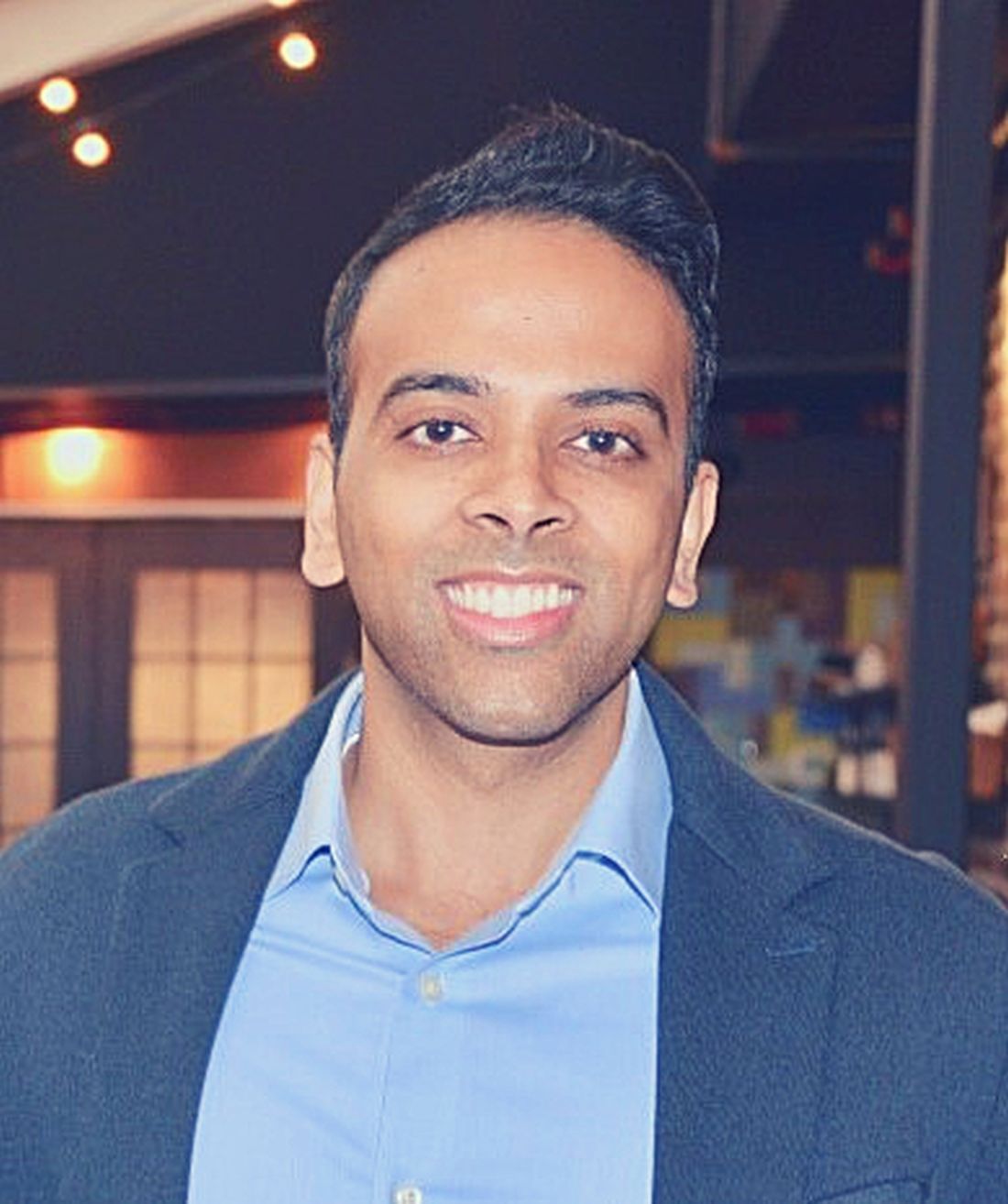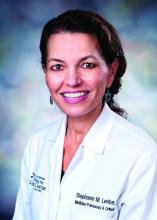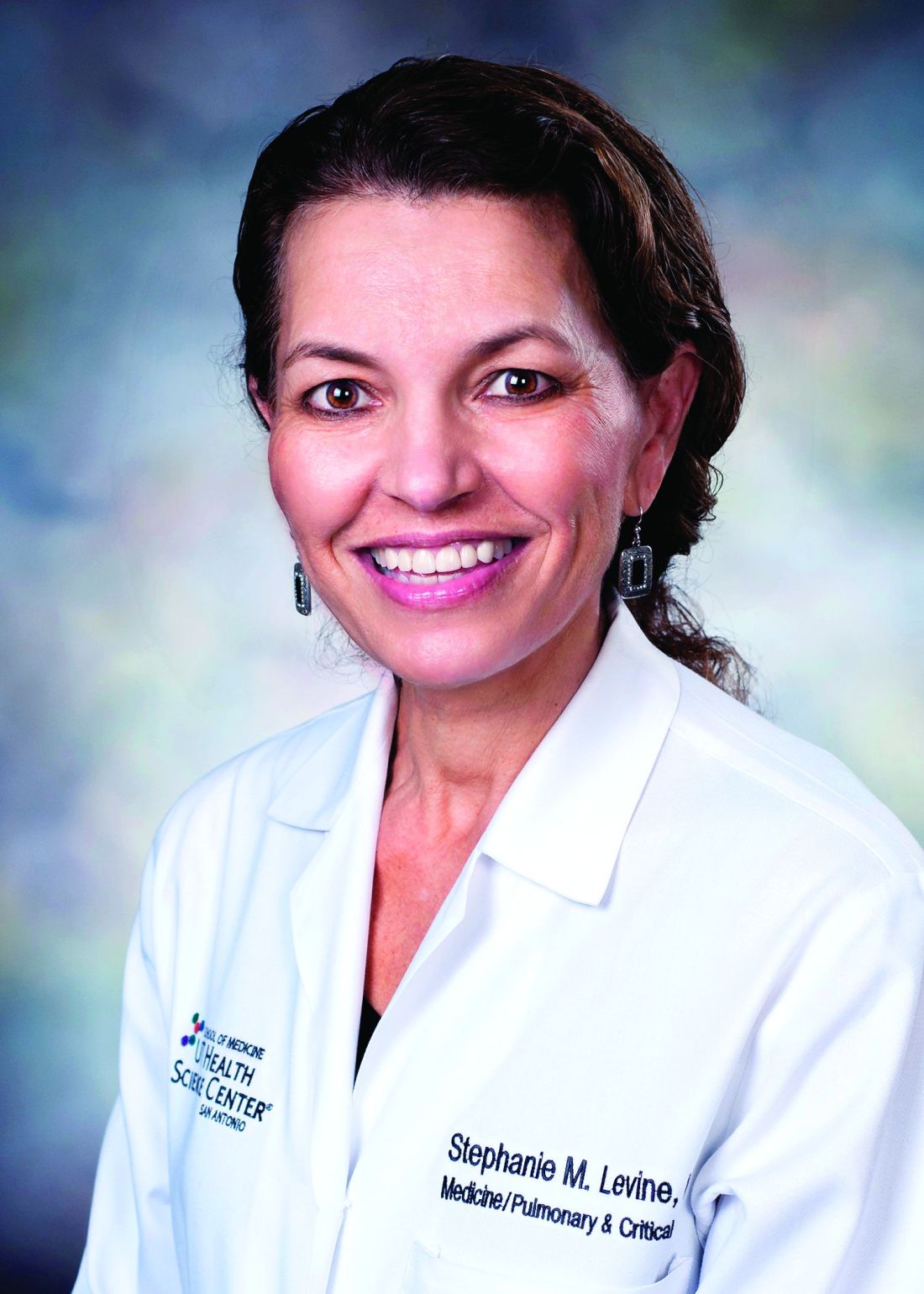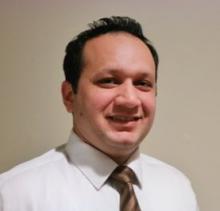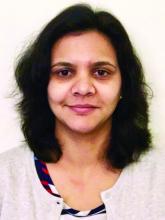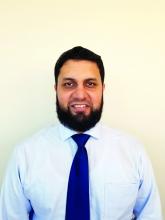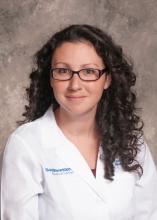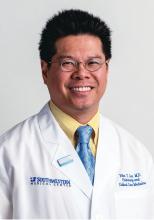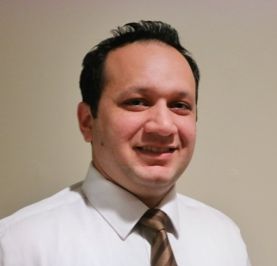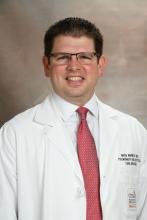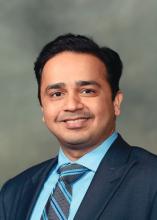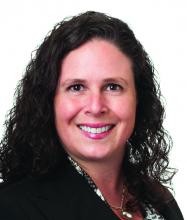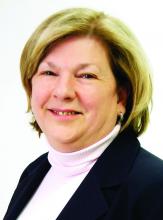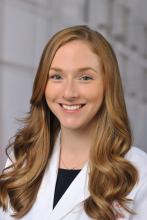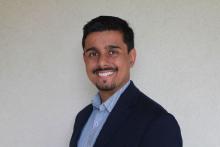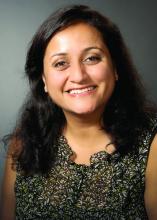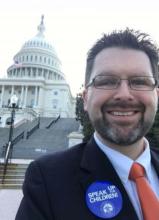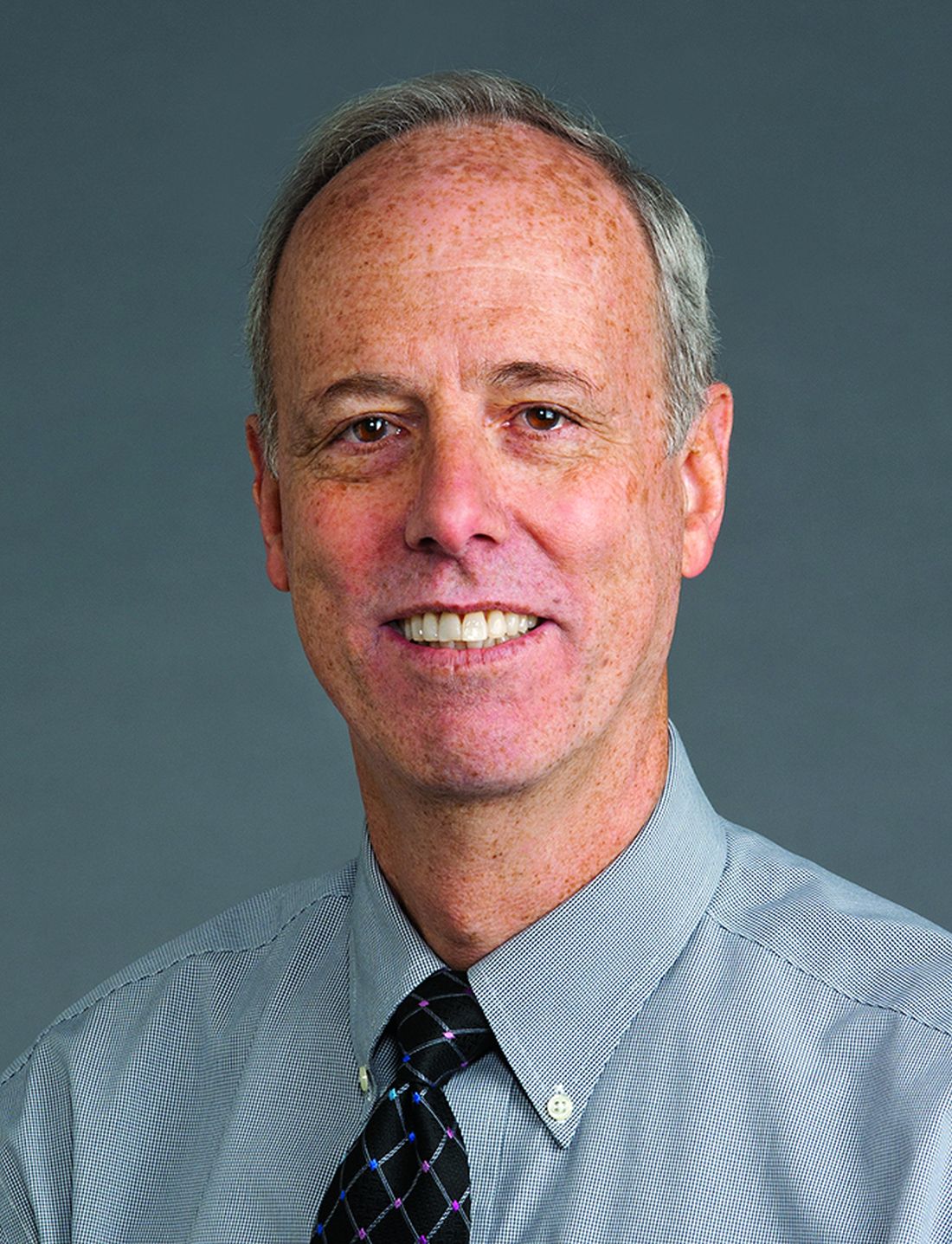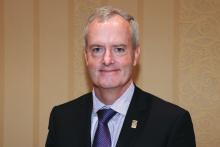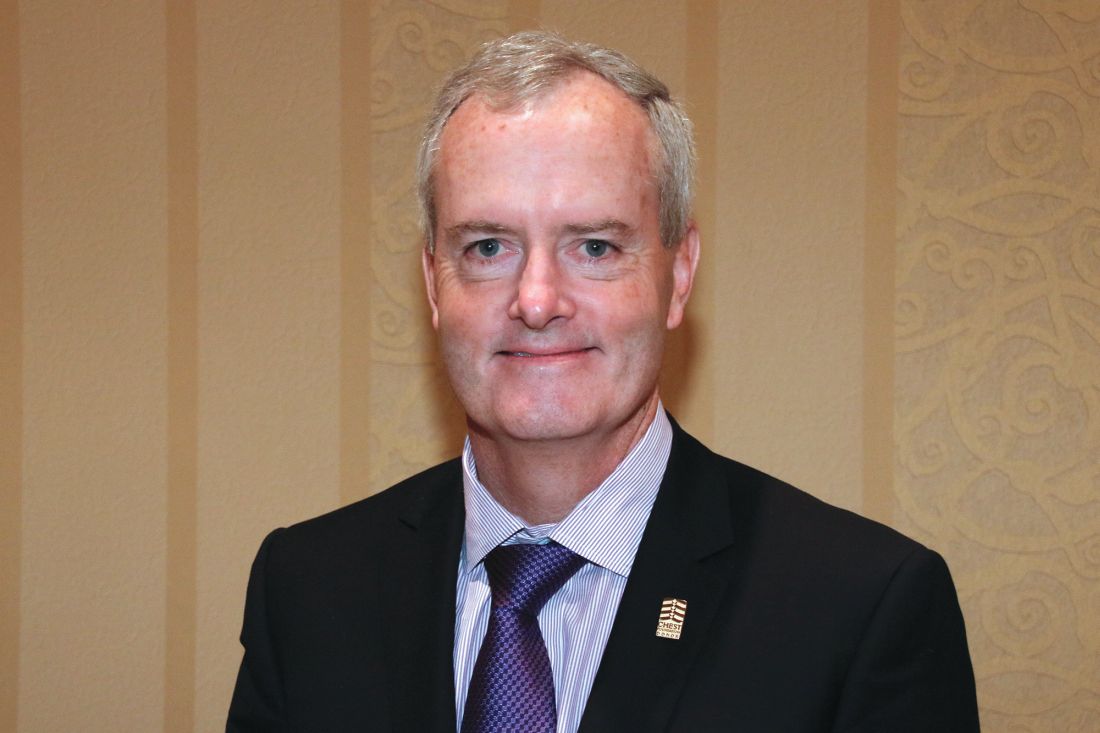User login
Thank you to the CHEST 2020 Scientific Program Committee
The CHEST 2020 Scientific Program Committee has been working tirelessly to select the best and most clinically relevant sessions for the upcoming meeting. CHEST would like to extend a heartfelt thank you to all that actively participated in grading, curriculum group calls, the live meeting in February, and all the homework in between. We’re not done, but your work has been instrumental in making the CHEST Annual Meeting 2020 a success.
The CHEST 2020 Scientific Program Committee has been working tirelessly to select the best and most clinically relevant sessions for the upcoming meeting. CHEST would like to extend a heartfelt thank you to all that actively participated in grading, curriculum group calls, the live meeting in February, and all the homework in between. We’re not done, but your work has been instrumental in making the CHEST Annual Meeting 2020 a success.
The CHEST 2020 Scientific Program Committee has been working tirelessly to select the best and most clinically relevant sessions for the upcoming meeting. CHEST would like to extend a heartfelt thank you to all that actively participated in grading, curriculum group calls, the live meeting in February, and all the homework in between. We’re not done, but your work has been instrumental in making the CHEST Annual Meeting 2020 a success.
This month in the journal CHEST®
Editor’s picks
CHEST Reviews
Critically ill patients with the HIV: 30 years later. By Dr. E. Azoulay, et al.
Phenotypic subtypes of obstructive sleep apnea: a challenge and opportunity for precision medicine. By Drs. A. Zinchuk and H. K. Yaggi.
Basic primer for finances in academic adult and pediatric pulmonary divisions. By Dr. L. Schnapp, et al.
Original research
Eligibility for lung volume reduction surgery in chronic obstructive pulmonary disease patients identified in a UK primary care setting. By Dr. H. Whittaker, et al.
Early life exposure to oral antibiotics and lung function into early adulthood. By Dr. K. dos Santos, et al.
Editor’s picks
Editor’s picks
CHEST Reviews
Critically ill patients with the HIV: 30 years later. By Dr. E. Azoulay, et al.
Phenotypic subtypes of obstructive sleep apnea: a challenge and opportunity for precision medicine. By Drs. A. Zinchuk and H. K. Yaggi.
Basic primer for finances in academic adult and pediatric pulmonary divisions. By Dr. L. Schnapp, et al.
Original research
Eligibility for lung volume reduction surgery in chronic obstructive pulmonary disease patients identified in a UK primary care setting. By Dr. H. Whittaker, et al.
Early life exposure to oral antibiotics and lung function into early adulthood. By Dr. K. dos Santos, et al.
CHEST Reviews
Critically ill patients with the HIV: 30 years later. By Dr. E. Azoulay, et al.
Phenotypic subtypes of obstructive sleep apnea: a challenge and opportunity for precision medicine. By Drs. A. Zinchuk and H. K. Yaggi.
Basic primer for finances in academic adult and pediatric pulmonary divisions. By Dr. L. Schnapp, et al.
Original research
Eligibility for lung volume reduction surgery in chronic obstructive pulmonary disease patients identified in a UK primary care setting. By Dr. H. Whittaker, et al.
Early life exposure to oral antibiotics and lung function into early adulthood. By Dr. K. dos Santos, et al.
Meet the FISH Bowl finalists
CHEST 2019 marked the inaugural FISH Bowl competition for attendees. Inspired by Shark Tank, our kinder, gentler, yet still competitive and cutting-edge FISH Bowl (Furthering Innovation and Science for Health) featured CHEST members disrupting our beliefs about how clinical care and education are performed. As health-care providers, they presented innovative ideas pertaining to education and clinical disease for pulmonary, critical care, and sleep medicine. Six finalists were chosen from dozens of submissions, and three emerged winners! In this new Meet the FISH Bowl Finalists series, CHEST introduces you to many of them – including Education Category Finalist Dr. Bhavani.
Name: Siva Bhavani
Institution: University of Chicago
Position: Pulmonary Critical Care Fellow
Title: Quizomics
Brief summary: Quizomics is a cutting-edge mobile app that hosts trivia competitions for medical conferences. Quizomics is unlike any medical trivia competition you have ever seen, because the Quizomics app can host 20,000 medical professionals simultaneously competing in the world’s largest medical trivia competition. Physicians compete among thousands of peers in their respective specialties to prepare for boards, obtain CME, and gain recognition in their fields as they fight their way to the top of the leaderboard!
1. What inspired your innovation? The average person checks their phone every 12 minutes, and this is no different at medical conferences. Whether you are in line for coffee, looking around at posters, or listening to a lecture - very little time passes before you are again checking your phone. The natural engagement we have with our phones can be leveraged for educational purposes by introducing gamified medical education platforms like Quizomics. I was inspired because the future of the medical conference demands digital engagement, gamified education, and large-scale social interaction. There is currently no platform that offers these services to prepare medical conferences for the digital education revolution that is coming.
2. Who do you think can benefit most from it, and why? The highest benefit is going to be to the physicians who are tired of the traditional CME options. Quizomics provides a high quality entertaining and educational platform for physicians to get CME while engaging and interacting with their peers. Further, physicians preparing for boards will find Quizomics an engaging alternative to the traditional textbooks. Finally, medical conferences will find that Quizomics can increase engagement, education, and attendance.
3. What do you see as challenges to your innovation gaining widespread acceptance? How can they be overcome? Content creation (trivia questions and explanations) is the biggest challenge to Quizomics. To overcome this, we plan to partner with tech-forward medical organizations that have high quality question banks in order to provide physicians with top-notch gamified education.
4. Why was it meaningful for you to emerge as a finalist in FISH Bowl 2019? FISH Bowl was an amazing opportunity to present Quizomics to others in the pulmonary/critical care specialty. Further, it was an opportunity to get direct feedback from leading educators in the field, and much of the resulting feedback has been incorporated into Quizomics.
5. What future do you envision for your innovation beyond FISH Bowl 2019? Quizomics is launching at a national neurosurgery board review course this winter. Following this pilot launch, Quizomics is scheduled for roll-out at Chicago area internal medicine residency programs through the summer of 2020. You can expect to see Quizomics at national conferences by 2021!
CHEST 2019 marked the inaugural FISH Bowl competition for attendees. Inspired by Shark Tank, our kinder, gentler, yet still competitive and cutting-edge FISH Bowl (Furthering Innovation and Science for Health) featured CHEST members disrupting our beliefs about how clinical care and education are performed. As health-care providers, they presented innovative ideas pertaining to education and clinical disease for pulmonary, critical care, and sleep medicine. Six finalists were chosen from dozens of submissions, and three emerged winners! In this new Meet the FISH Bowl Finalists series, CHEST introduces you to many of them – including Education Category Finalist Dr. Bhavani.
Name: Siva Bhavani
Institution: University of Chicago
Position: Pulmonary Critical Care Fellow
Title: Quizomics
Brief summary: Quizomics is a cutting-edge mobile app that hosts trivia competitions for medical conferences. Quizomics is unlike any medical trivia competition you have ever seen, because the Quizomics app can host 20,000 medical professionals simultaneously competing in the world’s largest medical trivia competition. Physicians compete among thousands of peers in their respective specialties to prepare for boards, obtain CME, and gain recognition in their fields as they fight their way to the top of the leaderboard!
1. What inspired your innovation? The average person checks their phone every 12 minutes, and this is no different at medical conferences. Whether you are in line for coffee, looking around at posters, or listening to a lecture - very little time passes before you are again checking your phone. The natural engagement we have with our phones can be leveraged for educational purposes by introducing gamified medical education platforms like Quizomics. I was inspired because the future of the medical conference demands digital engagement, gamified education, and large-scale social interaction. There is currently no platform that offers these services to prepare medical conferences for the digital education revolution that is coming.
2. Who do you think can benefit most from it, and why? The highest benefit is going to be to the physicians who are tired of the traditional CME options. Quizomics provides a high quality entertaining and educational platform for physicians to get CME while engaging and interacting with their peers. Further, physicians preparing for boards will find Quizomics an engaging alternative to the traditional textbooks. Finally, medical conferences will find that Quizomics can increase engagement, education, and attendance.
3. What do you see as challenges to your innovation gaining widespread acceptance? How can they be overcome? Content creation (trivia questions and explanations) is the biggest challenge to Quizomics. To overcome this, we plan to partner with tech-forward medical organizations that have high quality question banks in order to provide physicians with top-notch gamified education.
4. Why was it meaningful for you to emerge as a finalist in FISH Bowl 2019? FISH Bowl was an amazing opportunity to present Quizomics to others in the pulmonary/critical care specialty. Further, it was an opportunity to get direct feedback from leading educators in the field, and much of the resulting feedback has been incorporated into Quizomics.
5. What future do you envision for your innovation beyond FISH Bowl 2019? Quizomics is launching at a national neurosurgery board review course this winter. Following this pilot launch, Quizomics is scheduled for roll-out at Chicago area internal medicine residency programs through the summer of 2020. You can expect to see Quizomics at national conferences by 2021!
CHEST 2019 marked the inaugural FISH Bowl competition for attendees. Inspired by Shark Tank, our kinder, gentler, yet still competitive and cutting-edge FISH Bowl (Furthering Innovation and Science for Health) featured CHEST members disrupting our beliefs about how clinical care and education are performed. As health-care providers, they presented innovative ideas pertaining to education and clinical disease for pulmonary, critical care, and sleep medicine. Six finalists were chosen from dozens of submissions, and three emerged winners! In this new Meet the FISH Bowl Finalists series, CHEST introduces you to many of them – including Education Category Finalist Dr. Bhavani.
Name: Siva Bhavani
Institution: University of Chicago
Position: Pulmonary Critical Care Fellow
Title: Quizomics
Brief summary: Quizomics is a cutting-edge mobile app that hosts trivia competitions for medical conferences. Quizomics is unlike any medical trivia competition you have ever seen, because the Quizomics app can host 20,000 medical professionals simultaneously competing in the world’s largest medical trivia competition. Physicians compete among thousands of peers in their respective specialties to prepare for boards, obtain CME, and gain recognition in their fields as they fight their way to the top of the leaderboard!
1. What inspired your innovation? The average person checks their phone every 12 minutes, and this is no different at medical conferences. Whether you are in line for coffee, looking around at posters, or listening to a lecture - very little time passes before you are again checking your phone. The natural engagement we have with our phones can be leveraged for educational purposes by introducing gamified medical education platforms like Quizomics. I was inspired because the future of the medical conference demands digital engagement, gamified education, and large-scale social interaction. There is currently no platform that offers these services to prepare medical conferences for the digital education revolution that is coming.
2. Who do you think can benefit most from it, and why? The highest benefit is going to be to the physicians who are tired of the traditional CME options. Quizomics provides a high quality entertaining and educational platform for physicians to get CME while engaging and interacting with their peers. Further, physicians preparing for boards will find Quizomics an engaging alternative to the traditional textbooks. Finally, medical conferences will find that Quizomics can increase engagement, education, and attendance.
3. What do you see as challenges to your innovation gaining widespread acceptance? How can they be overcome? Content creation (trivia questions and explanations) is the biggest challenge to Quizomics. To overcome this, we plan to partner with tech-forward medical organizations that have high quality question banks in order to provide physicians with top-notch gamified education.
4. Why was it meaningful for you to emerge as a finalist in FISH Bowl 2019? FISH Bowl was an amazing opportunity to present Quizomics to others in the pulmonary/critical care specialty. Further, it was an opportunity to get direct feedback from leading educators in the field, and much of the resulting feedback has been incorporated into Quizomics.
5. What future do you envision for your innovation beyond FISH Bowl 2019? Quizomics is launching at a national neurosurgery board review course this winter. Following this pilot launch, Quizomics is scheduled for roll-out at Chicago area internal medicine residency programs through the summer of 2020. You can expect to see Quizomics at national conferences by 2021!
CHEST Foundation Casino Night promises fun for a good cause
Keeping the momentum from our first-ever CHEST Foundation Reception and Casino Night at CHEST 2019, where champions in attendance raised more than $35,000 for pulmonary fibrosis research, the CHEST Foundation continues our long-standing partnership with the Feldman Family Foundation and invites you to the 7th Annual Irv Feldman Texas Hold ‘Em Annual Tournament & Casino Night!
Funds raised at the event support the CHEST Foundation’s mission-based programming and directly impact patients living with pulmonary fibrosis by providing them with access to chest medicine experts; assistance in securing medication and portable oxygen; and empowering the patients and their clinicians to better manage their disease.
Join us at 6:00 PM on Saturday, March 7, at Chevy Chase Country Club in Wheeling, Illinois, for an exciting evening of play. The grand prize winner of the poker tournament receives a coveted seat at the World Series of Poker Main Event – allowing them to test their mettle against the world’s best players. We will also be hosting a plethora of other casino games like blackjack, craps, and roulette and an ever-expanding silent auction giving everyone a chance to join in on the fun and contribute to the fight against pulmonary fibrosis.
Interested in sponsoring the event, purchasing tickets, or receiving more information about the tournament? Contact Angela Perillo, Director of Development and Foundation Operations, at [email protected].
Hope to see you March 7th!
Keeping the momentum from our first-ever CHEST Foundation Reception and Casino Night at CHEST 2019, where champions in attendance raised more than $35,000 for pulmonary fibrosis research, the CHEST Foundation continues our long-standing partnership with the Feldman Family Foundation and invites you to the 7th Annual Irv Feldman Texas Hold ‘Em Annual Tournament & Casino Night!
Funds raised at the event support the CHEST Foundation’s mission-based programming and directly impact patients living with pulmonary fibrosis by providing them with access to chest medicine experts; assistance in securing medication and portable oxygen; and empowering the patients and their clinicians to better manage their disease.
Join us at 6:00 PM on Saturday, March 7, at Chevy Chase Country Club in Wheeling, Illinois, for an exciting evening of play. The grand prize winner of the poker tournament receives a coveted seat at the World Series of Poker Main Event – allowing them to test their mettle against the world’s best players. We will also be hosting a plethora of other casino games like blackjack, craps, and roulette and an ever-expanding silent auction giving everyone a chance to join in on the fun and contribute to the fight against pulmonary fibrosis.
Interested in sponsoring the event, purchasing tickets, or receiving more information about the tournament? Contact Angela Perillo, Director of Development and Foundation Operations, at [email protected].
Hope to see you March 7th!
Keeping the momentum from our first-ever CHEST Foundation Reception and Casino Night at CHEST 2019, where champions in attendance raised more than $35,000 for pulmonary fibrosis research, the CHEST Foundation continues our long-standing partnership with the Feldman Family Foundation and invites you to the 7th Annual Irv Feldman Texas Hold ‘Em Annual Tournament & Casino Night!
Funds raised at the event support the CHEST Foundation’s mission-based programming and directly impact patients living with pulmonary fibrosis by providing them with access to chest medicine experts; assistance in securing medication and portable oxygen; and empowering the patients and their clinicians to better manage their disease.
Join us at 6:00 PM on Saturday, March 7, at Chevy Chase Country Club in Wheeling, Illinois, for an exciting evening of play. The grand prize winner of the poker tournament receives a coveted seat at the World Series of Poker Main Event – allowing them to test their mettle against the world’s best players. We will also be hosting a plethora of other casino games like blackjack, craps, and roulette and an ever-expanding silent auction giving everyone a chance to join in on the fun and contribute to the fight against pulmonary fibrosis.
Interested in sponsoring the event, purchasing tickets, or receiving more information about the tournament? Contact Angela Perillo, Director of Development and Foundation Operations, at [email protected].
Hope to see you March 7th!
President’s report
After an outstanding annual meeting in New Orleans, with the greatest number of attendees and a number of other firsts, and with the holidays rapidly approaching, you might think there would be a lull in activity, but your CHEST leadership and staff have been busy. Let’s start with a CHEST 2019 recap.
This year’s meeting had a total of 5,960 medical professionals and 8,593 total attendees. All were the highest in CHEST history! In addition, there were more international attendees, and CHEST 2019 saw the largest number of fellows-in-training and the largest number of advanced practice providers attending.
Since CHEST 2019, we have held five live learning sessions at headquarters in Glenview, with a total of 281 attendees, including: Extracorporeal Support for Respiratory and Cardiac Failure in Adults; Critical Care Ultrasound: Integration Into Clinical Practice; Comprehensive Pleural Procedures; Ultrasonography: Essentials in Critical Care; and the Advanced Critical Care Echocardiography Board Review Exam Course. In case you missed those opportunities, in the near future, CHEST will be holding the following 2020 courses: Comprehensive Bronchoscopy With Endobronchial Ultrasound February 20 – 22, Mechanical Ventilation: Advanced Critical Care Management February 27 - 29, Ultrasonography: Essentials in Critical Care March 5 - 7, Bronchoscopy and Chest Tubes in the ICU March 20 - 21, Advanced Clinical Training in Pulmonary Function Testing March 27 - 28, Critical Skills for Critical Care: A State-of-the-Art Update, and Procedures for ICU Providers April 30 - May 2. For additional information, check out the events at chestnet.org.
Internationally, the program for the Italian CHEST Congress, to be held with the Italian CHEST Chapter in Bologna in June (June 25-27), is finished. This meeting will be designed on a smaller scale of that of the annual CHEST meeting, with plenty of educational opportunities in the areas of pulmonary, critical care, and sleep medicine, and will also feature faculty from around the world. Come experience all the education, as well as the beauty of Italy in June! CHEST has continued other international activities with leadership attendance and lectures at the Asian Pacific Society of Respirology (APSR), where we engaged with multiple societies as CHEST continues to grow our international strategy to educate those who request further education in our fields. CHEST also sent selected young investigators to the APSR meeting.
Plans are well under way to hold another successful annual meeting in Chicago - CHEST 2020. The call for topics has ended, and proposal grading is ongoing. The call for abstracts has gone out and will close March 31. We encourage all, including our learners in training, to submit high quality abstracts and case reports, and we will offer suggestions for those needing editorial assistance. This is one of the many ways to get CHEST-involved. In addition to the innovations and experiences we offered last year, there will be continued social media presence and new exciting offerings at this year’s annual meeting. Save the dates - October 17-21, in our home town of Chicago!
One of my goals for this year is to evaluate ways to increase engagement and leadership opportunities within the organization, with our CHEST NetWorks being one example. The work of the NetWorks task force is ongoing. Expect to see pilots of twitter handles, infographics, and e-bytes coming from some NetWorks in the near future.
The editorial board for the next volume of SEEK Critical Care has been selected, and work is under way for delivery of the next print edition and library update at the summer Board Review Courses in August in Washington DC. Your CHEST Journal Editorial Board has also been busy. The redesigned issue with the new content structure has hit mailboxes, and you can expect to see updated guidelines for “Managing Chronic Cough as a Symptom in Children and Management Algorithms: CHEST Guideline and Expert Panel Report” and “Chronic Cough Due to Stable Chronic Bronchitis: CHEST Expert Panel Report” out soon. Also, look for publications that CHEST has endorsed to include the College of American Pathologists’ supplement “Collection and Handling of Thoracic Small Biopsy and Cytology Specimens for Ancillary Studies” and the Society of Critical Care Medicine’s algorithm and bundle for the “Surviving Sepsis Campaign International Guidelines for the Management of Septic Shock and Sepsis-Associated Organ Dysfunction in Children.” CHEST had representatives to both of these writing groups. In addition, more podcasts will soon be on the horizon.
The CHEST Foundation gala, The Golden Era of EP (Erin Popovich) was held in early December at the AT & T center in San Antonio, with over 500 people in attendance, including many from the San Antonio community, current and former Spurs players and coaches, in addition to our leadership and staff. The Erin Popovich (EP) endowment is dedicated to empowerment and access for patients with interstitial lung disease, as well as research in this area. Over 3 million dollars have been raised to date to directly support this endowment. One of the early products from this endowment is the soon to be available Oxygen Access Toolkit, developed for use by provider offices, clinicians, DME suppliers, patients, and caregivers to answer some of the basic facts about access to oxygen that so many of our patients with ILD and other lung diseases need. Other resources will include the ILD Tree, Get a Second Opinion, You’re Not Alone Patient Journey, Mnemonic for ILD Patients, the Patients’ Bill of Rights, and a co-morbidities one–page information sheet.
After the next quarterly Board Meeting in January, I will update you on decisions regarding future strategy that emerge from that meeting. The agenda will include many of the topics mentioned above, in addition to a strategic discussion regarding CHEST’s increased role in advocacy, which has been requested by many members.
Of course, all these events and activities could not be accomplished without the incredible effort by your CHEST staff and volunteer leadership. I look forward to many updates in my next report. As always, please reach out to me with any comments, questions, or suggestions, and if I am unable to respond, I will address it with the appropriate staff person. Thank you all for being the most important reason that CHEST exists. Have a great 2020!
After an outstanding annual meeting in New Orleans, with the greatest number of attendees and a number of other firsts, and with the holidays rapidly approaching, you might think there would be a lull in activity, but your CHEST leadership and staff have been busy. Let’s start with a CHEST 2019 recap.
This year’s meeting had a total of 5,960 medical professionals and 8,593 total attendees. All were the highest in CHEST history! In addition, there were more international attendees, and CHEST 2019 saw the largest number of fellows-in-training and the largest number of advanced practice providers attending.
Since CHEST 2019, we have held five live learning sessions at headquarters in Glenview, with a total of 281 attendees, including: Extracorporeal Support for Respiratory and Cardiac Failure in Adults; Critical Care Ultrasound: Integration Into Clinical Practice; Comprehensive Pleural Procedures; Ultrasonography: Essentials in Critical Care; and the Advanced Critical Care Echocardiography Board Review Exam Course. In case you missed those opportunities, in the near future, CHEST will be holding the following 2020 courses: Comprehensive Bronchoscopy With Endobronchial Ultrasound February 20 – 22, Mechanical Ventilation: Advanced Critical Care Management February 27 - 29, Ultrasonography: Essentials in Critical Care March 5 - 7, Bronchoscopy and Chest Tubes in the ICU March 20 - 21, Advanced Clinical Training in Pulmonary Function Testing March 27 - 28, Critical Skills for Critical Care: A State-of-the-Art Update, and Procedures for ICU Providers April 30 - May 2. For additional information, check out the events at chestnet.org.
Internationally, the program for the Italian CHEST Congress, to be held with the Italian CHEST Chapter in Bologna in June (June 25-27), is finished. This meeting will be designed on a smaller scale of that of the annual CHEST meeting, with plenty of educational opportunities in the areas of pulmonary, critical care, and sleep medicine, and will also feature faculty from around the world. Come experience all the education, as well as the beauty of Italy in June! CHEST has continued other international activities with leadership attendance and lectures at the Asian Pacific Society of Respirology (APSR), where we engaged with multiple societies as CHEST continues to grow our international strategy to educate those who request further education in our fields. CHEST also sent selected young investigators to the APSR meeting.
Plans are well under way to hold another successful annual meeting in Chicago - CHEST 2020. The call for topics has ended, and proposal grading is ongoing. The call for abstracts has gone out and will close March 31. We encourage all, including our learners in training, to submit high quality abstracts and case reports, and we will offer suggestions for those needing editorial assistance. This is one of the many ways to get CHEST-involved. In addition to the innovations and experiences we offered last year, there will be continued social media presence and new exciting offerings at this year’s annual meeting. Save the dates - October 17-21, in our home town of Chicago!
One of my goals for this year is to evaluate ways to increase engagement and leadership opportunities within the organization, with our CHEST NetWorks being one example. The work of the NetWorks task force is ongoing. Expect to see pilots of twitter handles, infographics, and e-bytes coming from some NetWorks in the near future.
The editorial board for the next volume of SEEK Critical Care has been selected, and work is under way for delivery of the next print edition and library update at the summer Board Review Courses in August in Washington DC. Your CHEST Journal Editorial Board has also been busy. The redesigned issue with the new content structure has hit mailboxes, and you can expect to see updated guidelines for “Managing Chronic Cough as a Symptom in Children and Management Algorithms: CHEST Guideline and Expert Panel Report” and “Chronic Cough Due to Stable Chronic Bronchitis: CHEST Expert Panel Report” out soon. Also, look for publications that CHEST has endorsed to include the College of American Pathologists’ supplement “Collection and Handling of Thoracic Small Biopsy and Cytology Specimens for Ancillary Studies” and the Society of Critical Care Medicine’s algorithm and bundle for the “Surviving Sepsis Campaign International Guidelines for the Management of Septic Shock and Sepsis-Associated Organ Dysfunction in Children.” CHEST had representatives to both of these writing groups. In addition, more podcasts will soon be on the horizon.
The CHEST Foundation gala, The Golden Era of EP (Erin Popovich) was held in early December at the AT & T center in San Antonio, with over 500 people in attendance, including many from the San Antonio community, current and former Spurs players and coaches, in addition to our leadership and staff. The Erin Popovich (EP) endowment is dedicated to empowerment and access for patients with interstitial lung disease, as well as research in this area. Over 3 million dollars have been raised to date to directly support this endowment. One of the early products from this endowment is the soon to be available Oxygen Access Toolkit, developed for use by provider offices, clinicians, DME suppliers, patients, and caregivers to answer some of the basic facts about access to oxygen that so many of our patients with ILD and other lung diseases need. Other resources will include the ILD Tree, Get a Second Opinion, You’re Not Alone Patient Journey, Mnemonic for ILD Patients, the Patients’ Bill of Rights, and a co-morbidities one–page information sheet.
After the next quarterly Board Meeting in January, I will update you on decisions regarding future strategy that emerge from that meeting. The agenda will include many of the topics mentioned above, in addition to a strategic discussion regarding CHEST’s increased role in advocacy, which has been requested by many members.
Of course, all these events and activities could not be accomplished without the incredible effort by your CHEST staff and volunteer leadership. I look forward to many updates in my next report. As always, please reach out to me with any comments, questions, or suggestions, and if I am unable to respond, I will address it with the appropriate staff person. Thank you all for being the most important reason that CHEST exists. Have a great 2020!
After an outstanding annual meeting in New Orleans, with the greatest number of attendees and a number of other firsts, and with the holidays rapidly approaching, you might think there would be a lull in activity, but your CHEST leadership and staff have been busy. Let’s start with a CHEST 2019 recap.
This year’s meeting had a total of 5,960 medical professionals and 8,593 total attendees. All were the highest in CHEST history! In addition, there were more international attendees, and CHEST 2019 saw the largest number of fellows-in-training and the largest number of advanced practice providers attending.
Since CHEST 2019, we have held five live learning sessions at headquarters in Glenview, with a total of 281 attendees, including: Extracorporeal Support for Respiratory and Cardiac Failure in Adults; Critical Care Ultrasound: Integration Into Clinical Practice; Comprehensive Pleural Procedures; Ultrasonography: Essentials in Critical Care; and the Advanced Critical Care Echocardiography Board Review Exam Course. In case you missed those opportunities, in the near future, CHEST will be holding the following 2020 courses: Comprehensive Bronchoscopy With Endobronchial Ultrasound February 20 – 22, Mechanical Ventilation: Advanced Critical Care Management February 27 - 29, Ultrasonography: Essentials in Critical Care March 5 - 7, Bronchoscopy and Chest Tubes in the ICU March 20 - 21, Advanced Clinical Training in Pulmonary Function Testing March 27 - 28, Critical Skills for Critical Care: A State-of-the-Art Update, and Procedures for ICU Providers April 30 - May 2. For additional information, check out the events at chestnet.org.
Internationally, the program for the Italian CHEST Congress, to be held with the Italian CHEST Chapter in Bologna in June (June 25-27), is finished. This meeting will be designed on a smaller scale of that of the annual CHEST meeting, with plenty of educational opportunities in the areas of pulmonary, critical care, and sleep medicine, and will also feature faculty from around the world. Come experience all the education, as well as the beauty of Italy in June! CHEST has continued other international activities with leadership attendance and lectures at the Asian Pacific Society of Respirology (APSR), where we engaged with multiple societies as CHEST continues to grow our international strategy to educate those who request further education in our fields. CHEST also sent selected young investigators to the APSR meeting.
Plans are well under way to hold another successful annual meeting in Chicago - CHEST 2020. The call for topics has ended, and proposal grading is ongoing. The call for abstracts has gone out and will close March 31. We encourage all, including our learners in training, to submit high quality abstracts and case reports, and we will offer suggestions for those needing editorial assistance. This is one of the many ways to get CHEST-involved. In addition to the innovations and experiences we offered last year, there will be continued social media presence and new exciting offerings at this year’s annual meeting. Save the dates - October 17-21, in our home town of Chicago!
One of my goals for this year is to evaluate ways to increase engagement and leadership opportunities within the organization, with our CHEST NetWorks being one example. The work of the NetWorks task force is ongoing. Expect to see pilots of twitter handles, infographics, and e-bytes coming from some NetWorks in the near future.
The editorial board for the next volume of SEEK Critical Care has been selected, and work is under way for delivery of the next print edition and library update at the summer Board Review Courses in August in Washington DC. Your CHEST Journal Editorial Board has also been busy. The redesigned issue with the new content structure has hit mailboxes, and you can expect to see updated guidelines for “Managing Chronic Cough as a Symptom in Children and Management Algorithms: CHEST Guideline and Expert Panel Report” and “Chronic Cough Due to Stable Chronic Bronchitis: CHEST Expert Panel Report” out soon. Also, look for publications that CHEST has endorsed to include the College of American Pathologists’ supplement “Collection and Handling of Thoracic Small Biopsy and Cytology Specimens for Ancillary Studies” and the Society of Critical Care Medicine’s algorithm and bundle for the “Surviving Sepsis Campaign International Guidelines for the Management of Septic Shock and Sepsis-Associated Organ Dysfunction in Children.” CHEST had representatives to both of these writing groups. In addition, more podcasts will soon be on the horizon.
The CHEST Foundation gala, The Golden Era of EP (Erin Popovich) was held in early December at the AT & T center in San Antonio, with over 500 people in attendance, including many from the San Antonio community, current and former Spurs players and coaches, in addition to our leadership and staff. The Erin Popovich (EP) endowment is dedicated to empowerment and access for patients with interstitial lung disease, as well as research in this area. Over 3 million dollars have been raised to date to directly support this endowment. One of the early products from this endowment is the soon to be available Oxygen Access Toolkit, developed for use by provider offices, clinicians, DME suppliers, patients, and caregivers to answer some of the basic facts about access to oxygen that so many of our patients with ILD and other lung diseases need. Other resources will include the ILD Tree, Get a Second Opinion, You’re Not Alone Patient Journey, Mnemonic for ILD Patients, the Patients’ Bill of Rights, and a co-morbidities one–page information sheet.
After the next quarterly Board Meeting in January, I will update you on decisions regarding future strategy that emerge from that meeting. The agenda will include many of the topics mentioned above, in addition to a strategic discussion regarding CHEST’s increased role in advocacy, which has been requested by many members.
Of course, all these events and activities could not be accomplished without the incredible effort by your CHEST staff and volunteer leadership. I look forward to many updates in my next report. As always, please reach out to me with any comments, questions, or suggestions, and if I am unable to respond, I will address it with the appropriate staff person. Thank you all for being the most important reason that CHEST exists. Have a great 2020!
Beta-blockers in COPD
Airway disorders
Beta-blockers in COPD: A settled debate?
Beta-blockers are the cornerstone in the management of patients with heart failure and myocardial infarction where they have shown to improve morbidity and mortality. Cardiovascular disease is common in patients with COPD. A 2014 meta-analysis of retrospective studies involving patients with COPD using a beta-blocker has shown lower death and lower exacerbation rate (Du Q, et al. PLoS One. 2014;9[11]:e113048). More recent studies continue to note underutilization of beta-blockers in patients with COPD due to concerns for adverse effects on pulmonary function (Lipworth B, et al. Heart. 2016;102[23]:1909).
To further study these concerns, Dransfield and colleagues conducted a randomized controlled trial (BLOCK COPD) of 532 randomly assigned patients to receive either metoprolol or placebo (Dransfield, et al. N Engl J Med. 2019;381[24]:2304). Primary outcome was time to first COPD exacerbation whereas secondary outcomes included rate of exacerbation, mortality, hospitalization, symptoms, and spirometry data. Median time to exacerbation was similar between the two groups; however, metoprolol was associated with higher incidence of severe exacerbation requiring hospitalization (HR 1.91, 95% CI 1.29-2.83). There was nonstatistical increase in deaths in metoprolol group, mainly contributed by fatal COPD events (seven in metoprolol vs one in placebo). The study results validated some of the concerns of worsening pulmonary function with beta-blocker use; however, in order to better understand the study results, we must pay attention to the study cohort.
In summary, patients did not have significant cardiac disease and, therefore, did not have an overt indication for beta-blocker use. Patients with COPD in this study were sicker than average patients. Lastly, there were more patients in the metoprolol group who had COPD exacerbations requiring ED visit or hospitalization in 12 months prior to study enrollment. For the above-mentioned reasons, the conclusion of this study should not discourage the use of beta-blockers in patients with COPD when underlying cardiac disease warrants their use, after careful consideration of benefits and risks.
Muhammad Adrish, MD, FCCP, Steering Committee Member
Navitha Ramesh, MD, FCCP, Steering Committee Member
Clinical research
Nintedanib in progressive fibrosing interstitial lung diseases: Does one size really fit all?
Interstitial lung diseases (ILDs) include a variety of lung disorders, such as idiopathic interstitial pneumonias (IIPs), autoimmune diseases, granulomatous lung disease, and environmental diseases. They all have one thing in common—a progressive fibrosing phenotype that is almost universally fatal. It has been suggested that such diseases have a shared pathophysiologic mechanism irrespective of the cause and, hence, could respond to similar therapy. Nintedanib acts intracellularly by inhibiting multiple tyrosine kinases. Previous clinical trials have suggested that nintedanib inhibits the progression of lung fibrosis in patients with idiopathic pulmonary fibrosis (Richeldi, et al. N Engl J Med. 2014;370[22]:2071) and systemic sclerosis-associated ILD (Distler, et al. N Engl J Med. 2019;380[26]:2518). The INBUILD trial was conducted to study the efficacy and safety of nintedanib in patients with fibrosing interstitial lung diseases (Flaherty, et al. N Engl J Med. 2019;381[18]:1718).
Patients with a wide spectrum of progressive fibrosing ILD were enrolled in the INBUILD trial. This gave the phenotypic approach needed to study the effects of nintedanib in fibrosing ILDs. The authors reported an absolute difference of 107 mL in the annual rate of decline in forced vital capacity in the overall population, 128.2 mL (95% CI 65.4 to 148.5; P less than .001) in patients with UIP-like fibrotic pattern and 75.3 mL in patients with other fibrotic patterns, between patients who received nintedanib and those who received placebo. Earlier studies have shown similar results in patients with IPF. The most frequent adverse event was diarrhea (66.9% in the nintedanib group and 23.9% in placebo group). Liver enzymes derangement was more common in the nintedanib group. Nausea, vomiting, abdominal pain, decreased appetite, and weight decrease were also more frequent in the nintedanib group than in those in the placebo group. In conclusion, this study not only explored the effects of nintedanib on progressive fibrosing ILDs but also helped to enhance the understanding of their natural history, suggesting a final common pathway toward lung fibrosis.
Mohsin Ijaz, MD, FCCP, Steering Committee Member
Critical care
Vaping-related acute lung injury: Where there’s smoke, there’s fire
E-cigarette or vaping product use–associated lung injury (EVALI) is a burgeoning public health problem in the United States. There have been more than 2,506 hospitalizations and 54 deaths from EVALI (cdc.gov). Unfortunately, the diagnosis is one of exclusion at present. The CDC defines EVALI as lung disease associated with e-cigarette or vaping exposure within 90 days, infiltrates, and absence of other causes (Layden, et al. N Engl J Med. 2019 Sep 6. doi: 10.1056/NEJMoa1911614). As critical care providers, we are uniquely poised to detect and treat this illness, given that roughly 1 in 3 patients with EVALI require mechanical ventilation. Moreover, one-quarter of rehospitalizations and deaths occur 2 days after discharge from initial hospitalization (Mikosz, et al. MMWR 2020;68[5152]:1183). .
To better identify EVALI, the Centers for Disease Control and Prevention (CDC) recommends that health-care providers ask e-cigarette or vaping product users about respiratory, gastrointestinal, and constitutional symptoms, obtain chest imaging in those suspected of EVALI, consider outpatient management of stable patients, test for influenza, and use caution when prescribing steroids in the outpatient setting. Emphasizing cessation and advocating for annual influenza vaccination is also recommended (Update: Interim Guidance for Health Care Providers for Managing Patients with Suspected E-cigarette, or Vaping, Product Use–Associated Lung Injury. (MMWR. 2019;68[46]:1081).
So how can critical care providers assist in the understanding and treatment of EVALI? Critical care physicians treating patients with EVALI face unique challenges moving forward. We need to develop a better understanding of the triggers and pathophysiology of EVALI and learn to improve our recognition of the disease. We should study interventions that may improve outcomes such as corticosteroids. We know little about the long-term outcomes and sequalae of EVALI.
The best treatment for EVALI is prevention. Critical care physicians are experts at identifying and treating life-threatening conditions but as a community have less experience in the public health arena. If as physicians we are called upon to advocate for our patients, then perhaps there is a role for critical care physicians to advocate for a ban on vaping.
Matthew K. Hensley, MD, MPH, Fellow-in-Training
Daniel R. Ouellette, MD, MS, FCCP, NetWork Vice-Chair
Home-based mechanical ventilation and neuromuscular disease
Keeping up with the times: incorporating home mechanical ventilation education into pulmonary and critical care fellowship and clinical practice
Home mechanical ventilation (HMV) utilization for patients with chronic respiratory conditions is rapidly increasing in both pediatric and adult populations. By 2016, the estimated prevalence of HMV was 2.9-12.9/100,000 (3.1-18% via tracheotomy) (Rose, et al. Respir Care. 2015;60[5]:695; Valko, et al. BMC Pulm Med. 2018;18[1]:190). In 2012 limited regional U.S. data were extrapolated to approximate a prevalence of 4.7-6.4/100,000 children utilizing HMV (King, A. Respir Care. 2012;57[6]921), but there is currently no comprehensive registry of HMV use in the United States. A U.S. Department of Health and Human Services report in 2016 described an 85-fold increase in Medicare claims for home ventilators in 2015 compared with 2009 (OEI-12-15-00370; 9/22/2016).
With increasing demand, educating clinicians responsible for providing and managing HMV is paramount. Education specific to longitudinal management of the HMV is noticeably overlooked. The ACGME core competencies for PCCM fellowships include principles inherent to HMV, including modes/principles of ventilation, modalities/principles of oxygen supplementation, tracheostomy tube management, as well as the use of “masks for delivery of supplemental oxygen, humidifiers, nebulizers, and incentive spirometry” (ACGME Common Program Requirements 7/1/2019). However, training programs are not required to provide skills essential in HMV management, including: (1) appropriate patient selection for long-term HMV, (2) selection of well-matched home ventilators suited to patients’ chronic conditions, (3) assessment/timing of transition to invasive ventilation, or (4) adjustments necessary to maintain optimal ventilator support. Life-sustaining ventilators used in ICUs differ from life-supporting HMV systems in modes, interface, cost, algorithms, circuitry, and available adjuncts.
There is an opportunity (and responsibility) to improve current training guidelines to meet growing needs of the population and anticipate needs of trainees as they enter unsupervised practice. Although simulation initiatives at national CHEST meetings attempt to bridge education gaps, it is incumbent upon fellowship training programs to prepare pulmonologists with skills to manage HMV in order to maintain high standards of care in a safe, financially responsible and evidence-based manner.
Bethany L. Lussier, MD, FCCP, NetWork Member
Won Y. Lee, MD, FCCP. Steering Committee Member
Interstitial and diffuse lung disease
Granulomatous lymphocytic interstitial lung disease (GL-ILD)
Among the granulomatous lung diseases, Gl-ILD is hardly a new discovery, but for many reasons, it often goes undiagnosed for years. The relative rareness of the disease itself and, hence, the lack of awareness makes it an uncommon differential for granulomatous ILD. Patients with GL-ILD are often misdiagnosed with sarcoidosis, unspecified ILD, or lymphoid interstitial pneumonia, etc, before receiving a diagnosis of GL-ILD.
GL-ILD is seen in 5% to 22% of patients with common variable immunoglobulin deficiency (CVID). There are instances where patients are diagnosed with CVID based on a radiologic or histologic diagnosis of GL-ILD. Although GL-ILD suggests a pulmonary process, it actually encompasses a multisystemic granulomatous inflammatory disease that may affect the liver, spleen, bowels, lymphoid tissue, and conceivably any other organ system (Hartono, et al. Ann Allergy Asthma Immunol. 2017;118[5]:614. Pathogenesis of GL-ILD in CVID includes dysfunctional antigen handling (due to impaired T cell function) and aberrant immune response to viruses (Hurst, et al. J Allergy Clin Immunol Pract. 2017;5[4]:938).
Patients with GL-ILD often present with progressive shortness of breath, restrictive lung functions with a background of CVID. Imaging findings are 5-30 mm lower lobe-predominant, nodules, ground glass opacities, and splenomegaly. Histopathology varies with predominant granulomas vs lymphocytic infiltrates. The process can be treated and often reversed with use of high dose immunoglobulin replacement, immunomodulatory therapy with agents like azathioprine, and rituximab. However, steroids are not helpful. Due to the lymphocytic dysregulation in GL-ILD, patients are at high risk of death from lymphoma. Part of the management is surveillance for malignancy and involvement of other organ systems.
A. Thanushi Wynn, MD, Fellow-in-Training
Airway disorders
Beta-blockers in COPD: A settled debate?
Beta-blockers are the cornerstone in the management of patients with heart failure and myocardial infarction where they have shown to improve morbidity and mortality. Cardiovascular disease is common in patients with COPD. A 2014 meta-analysis of retrospective studies involving patients with COPD using a beta-blocker has shown lower death and lower exacerbation rate (Du Q, et al. PLoS One. 2014;9[11]:e113048). More recent studies continue to note underutilization of beta-blockers in patients with COPD due to concerns for adverse effects on pulmonary function (Lipworth B, et al. Heart. 2016;102[23]:1909).
To further study these concerns, Dransfield and colleagues conducted a randomized controlled trial (BLOCK COPD) of 532 randomly assigned patients to receive either metoprolol or placebo (Dransfield, et al. N Engl J Med. 2019;381[24]:2304). Primary outcome was time to first COPD exacerbation whereas secondary outcomes included rate of exacerbation, mortality, hospitalization, symptoms, and spirometry data. Median time to exacerbation was similar between the two groups; however, metoprolol was associated with higher incidence of severe exacerbation requiring hospitalization (HR 1.91, 95% CI 1.29-2.83). There was nonstatistical increase in deaths in metoprolol group, mainly contributed by fatal COPD events (seven in metoprolol vs one in placebo). The study results validated some of the concerns of worsening pulmonary function with beta-blocker use; however, in order to better understand the study results, we must pay attention to the study cohort.
In summary, patients did not have significant cardiac disease and, therefore, did not have an overt indication for beta-blocker use. Patients with COPD in this study were sicker than average patients. Lastly, there were more patients in the metoprolol group who had COPD exacerbations requiring ED visit or hospitalization in 12 months prior to study enrollment. For the above-mentioned reasons, the conclusion of this study should not discourage the use of beta-blockers in patients with COPD when underlying cardiac disease warrants their use, after careful consideration of benefits and risks.
Muhammad Adrish, MD, FCCP, Steering Committee Member
Navitha Ramesh, MD, FCCP, Steering Committee Member
Clinical research
Nintedanib in progressive fibrosing interstitial lung diseases: Does one size really fit all?
Interstitial lung diseases (ILDs) include a variety of lung disorders, such as idiopathic interstitial pneumonias (IIPs), autoimmune diseases, granulomatous lung disease, and environmental diseases. They all have one thing in common—a progressive fibrosing phenotype that is almost universally fatal. It has been suggested that such diseases have a shared pathophysiologic mechanism irrespective of the cause and, hence, could respond to similar therapy. Nintedanib acts intracellularly by inhibiting multiple tyrosine kinases. Previous clinical trials have suggested that nintedanib inhibits the progression of lung fibrosis in patients with idiopathic pulmonary fibrosis (Richeldi, et al. N Engl J Med. 2014;370[22]:2071) and systemic sclerosis-associated ILD (Distler, et al. N Engl J Med. 2019;380[26]:2518). The INBUILD trial was conducted to study the efficacy and safety of nintedanib in patients with fibrosing interstitial lung diseases (Flaherty, et al. N Engl J Med. 2019;381[18]:1718).
Patients with a wide spectrum of progressive fibrosing ILD were enrolled in the INBUILD trial. This gave the phenotypic approach needed to study the effects of nintedanib in fibrosing ILDs. The authors reported an absolute difference of 107 mL in the annual rate of decline in forced vital capacity in the overall population, 128.2 mL (95% CI 65.4 to 148.5; P less than .001) in patients with UIP-like fibrotic pattern and 75.3 mL in patients with other fibrotic patterns, between patients who received nintedanib and those who received placebo. Earlier studies have shown similar results in patients with IPF. The most frequent adverse event was diarrhea (66.9% in the nintedanib group and 23.9% in placebo group). Liver enzymes derangement was more common in the nintedanib group. Nausea, vomiting, abdominal pain, decreased appetite, and weight decrease were also more frequent in the nintedanib group than in those in the placebo group. In conclusion, this study not only explored the effects of nintedanib on progressive fibrosing ILDs but also helped to enhance the understanding of their natural history, suggesting a final common pathway toward lung fibrosis.
Mohsin Ijaz, MD, FCCP, Steering Committee Member
Critical care
Vaping-related acute lung injury: Where there’s smoke, there’s fire
E-cigarette or vaping product use–associated lung injury (EVALI) is a burgeoning public health problem in the United States. There have been more than 2,506 hospitalizations and 54 deaths from EVALI (cdc.gov). Unfortunately, the diagnosis is one of exclusion at present. The CDC defines EVALI as lung disease associated with e-cigarette or vaping exposure within 90 days, infiltrates, and absence of other causes (Layden, et al. N Engl J Med. 2019 Sep 6. doi: 10.1056/NEJMoa1911614). As critical care providers, we are uniquely poised to detect and treat this illness, given that roughly 1 in 3 patients with EVALI require mechanical ventilation. Moreover, one-quarter of rehospitalizations and deaths occur 2 days after discharge from initial hospitalization (Mikosz, et al. MMWR 2020;68[5152]:1183). .
To better identify EVALI, the Centers for Disease Control and Prevention (CDC) recommends that health-care providers ask e-cigarette or vaping product users about respiratory, gastrointestinal, and constitutional symptoms, obtain chest imaging in those suspected of EVALI, consider outpatient management of stable patients, test for influenza, and use caution when prescribing steroids in the outpatient setting. Emphasizing cessation and advocating for annual influenza vaccination is also recommended (Update: Interim Guidance for Health Care Providers for Managing Patients with Suspected E-cigarette, or Vaping, Product Use–Associated Lung Injury. (MMWR. 2019;68[46]:1081).
So how can critical care providers assist in the understanding and treatment of EVALI? Critical care physicians treating patients with EVALI face unique challenges moving forward. We need to develop a better understanding of the triggers and pathophysiology of EVALI and learn to improve our recognition of the disease. We should study interventions that may improve outcomes such as corticosteroids. We know little about the long-term outcomes and sequalae of EVALI.
The best treatment for EVALI is prevention. Critical care physicians are experts at identifying and treating life-threatening conditions but as a community have less experience in the public health arena. If as physicians we are called upon to advocate for our patients, then perhaps there is a role for critical care physicians to advocate for a ban on vaping.
Matthew K. Hensley, MD, MPH, Fellow-in-Training
Daniel R. Ouellette, MD, MS, FCCP, NetWork Vice-Chair
Home-based mechanical ventilation and neuromuscular disease
Keeping up with the times: incorporating home mechanical ventilation education into pulmonary and critical care fellowship and clinical practice
Home mechanical ventilation (HMV) utilization for patients with chronic respiratory conditions is rapidly increasing in both pediatric and adult populations. By 2016, the estimated prevalence of HMV was 2.9-12.9/100,000 (3.1-18% via tracheotomy) (Rose, et al. Respir Care. 2015;60[5]:695; Valko, et al. BMC Pulm Med. 2018;18[1]:190). In 2012 limited regional U.S. data were extrapolated to approximate a prevalence of 4.7-6.4/100,000 children utilizing HMV (King, A. Respir Care. 2012;57[6]921), but there is currently no comprehensive registry of HMV use in the United States. A U.S. Department of Health and Human Services report in 2016 described an 85-fold increase in Medicare claims for home ventilators in 2015 compared with 2009 (OEI-12-15-00370; 9/22/2016).
With increasing demand, educating clinicians responsible for providing and managing HMV is paramount. Education specific to longitudinal management of the HMV is noticeably overlooked. The ACGME core competencies for PCCM fellowships include principles inherent to HMV, including modes/principles of ventilation, modalities/principles of oxygen supplementation, tracheostomy tube management, as well as the use of “masks for delivery of supplemental oxygen, humidifiers, nebulizers, and incentive spirometry” (ACGME Common Program Requirements 7/1/2019). However, training programs are not required to provide skills essential in HMV management, including: (1) appropriate patient selection for long-term HMV, (2) selection of well-matched home ventilators suited to patients’ chronic conditions, (3) assessment/timing of transition to invasive ventilation, or (4) adjustments necessary to maintain optimal ventilator support. Life-sustaining ventilators used in ICUs differ from life-supporting HMV systems in modes, interface, cost, algorithms, circuitry, and available adjuncts.
There is an opportunity (and responsibility) to improve current training guidelines to meet growing needs of the population and anticipate needs of trainees as they enter unsupervised practice. Although simulation initiatives at national CHEST meetings attempt to bridge education gaps, it is incumbent upon fellowship training programs to prepare pulmonologists with skills to manage HMV in order to maintain high standards of care in a safe, financially responsible and evidence-based manner.
Bethany L. Lussier, MD, FCCP, NetWork Member
Won Y. Lee, MD, FCCP. Steering Committee Member
Interstitial and diffuse lung disease
Granulomatous lymphocytic interstitial lung disease (GL-ILD)
Among the granulomatous lung diseases, Gl-ILD is hardly a new discovery, but for many reasons, it often goes undiagnosed for years. The relative rareness of the disease itself and, hence, the lack of awareness makes it an uncommon differential for granulomatous ILD. Patients with GL-ILD are often misdiagnosed with sarcoidosis, unspecified ILD, or lymphoid interstitial pneumonia, etc, before receiving a diagnosis of GL-ILD.
GL-ILD is seen in 5% to 22% of patients with common variable immunoglobulin deficiency (CVID). There are instances where patients are diagnosed with CVID based on a radiologic or histologic diagnosis of GL-ILD. Although GL-ILD suggests a pulmonary process, it actually encompasses a multisystemic granulomatous inflammatory disease that may affect the liver, spleen, bowels, lymphoid tissue, and conceivably any other organ system (Hartono, et al. Ann Allergy Asthma Immunol. 2017;118[5]:614. Pathogenesis of GL-ILD in CVID includes dysfunctional antigen handling (due to impaired T cell function) and aberrant immune response to viruses (Hurst, et al. J Allergy Clin Immunol Pract. 2017;5[4]:938).
Patients with GL-ILD often present with progressive shortness of breath, restrictive lung functions with a background of CVID. Imaging findings are 5-30 mm lower lobe-predominant, nodules, ground glass opacities, and splenomegaly. Histopathology varies with predominant granulomas vs lymphocytic infiltrates. The process can be treated and often reversed with use of high dose immunoglobulin replacement, immunomodulatory therapy with agents like azathioprine, and rituximab. However, steroids are not helpful. Due to the lymphocytic dysregulation in GL-ILD, patients are at high risk of death from lymphoma. Part of the management is surveillance for malignancy and involvement of other organ systems.
A. Thanushi Wynn, MD, Fellow-in-Training
Airway disorders
Beta-blockers in COPD: A settled debate?
Beta-blockers are the cornerstone in the management of patients with heart failure and myocardial infarction where they have shown to improve morbidity and mortality. Cardiovascular disease is common in patients with COPD. A 2014 meta-analysis of retrospective studies involving patients with COPD using a beta-blocker has shown lower death and lower exacerbation rate (Du Q, et al. PLoS One. 2014;9[11]:e113048). More recent studies continue to note underutilization of beta-blockers in patients with COPD due to concerns for adverse effects on pulmonary function (Lipworth B, et al. Heart. 2016;102[23]:1909).
To further study these concerns, Dransfield and colleagues conducted a randomized controlled trial (BLOCK COPD) of 532 randomly assigned patients to receive either metoprolol or placebo (Dransfield, et al. N Engl J Med. 2019;381[24]:2304). Primary outcome was time to first COPD exacerbation whereas secondary outcomes included rate of exacerbation, mortality, hospitalization, symptoms, and spirometry data. Median time to exacerbation was similar between the two groups; however, metoprolol was associated with higher incidence of severe exacerbation requiring hospitalization (HR 1.91, 95% CI 1.29-2.83). There was nonstatistical increase in deaths in metoprolol group, mainly contributed by fatal COPD events (seven in metoprolol vs one in placebo). The study results validated some of the concerns of worsening pulmonary function with beta-blocker use; however, in order to better understand the study results, we must pay attention to the study cohort.
In summary, patients did not have significant cardiac disease and, therefore, did not have an overt indication for beta-blocker use. Patients with COPD in this study were sicker than average patients. Lastly, there were more patients in the metoprolol group who had COPD exacerbations requiring ED visit or hospitalization in 12 months prior to study enrollment. For the above-mentioned reasons, the conclusion of this study should not discourage the use of beta-blockers in patients with COPD when underlying cardiac disease warrants their use, after careful consideration of benefits and risks.
Muhammad Adrish, MD, FCCP, Steering Committee Member
Navitha Ramesh, MD, FCCP, Steering Committee Member
Clinical research
Nintedanib in progressive fibrosing interstitial lung diseases: Does one size really fit all?
Interstitial lung diseases (ILDs) include a variety of lung disorders, such as idiopathic interstitial pneumonias (IIPs), autoimmune diseases, granulomatous lung disease, and environmental diseases. They all have one thing in common—a progressive fibrosing phenotype that is almost universally fatal. It has been suggested that such diseases have a shared pathophysiologic mechanism irrespective of the cause and, hence, could respond to similar therapy. Nintedanib acts intracellularly by inhibiting multiple tyrosine kinases. Previous clinical trials have suggested that nintedanib inhibits the progression of lung fibrosis in patients with idiopathic pulmonary fibrosis (Richeldi, et al. N Engl J Med. 2014;370[22]:2071) and systemic sclerosis-associated ILD (Distler, et al. N Engl J Med. 2019;380[26]:2518). The INBUILD trial was conducted to study the efficacy and safety of nintedanib in patients with fibrosing interstitial lung diseases (Flaherty, et al. N Engl J Med. 2019;381[18]:1718).
Patients with a wide spectrum of progressive fibrosing ILD were enrolled in the INBUILD trial. This gave the phenotypic approach needed to study the effects of nintedanib in fibrosing ILDs. The authors reported an absolute difference of 107 mL in the annual rate of decline in forced vital capacity in the overall population, 128.2 mL (95% CI 65.4 to 148.5; P less than .001) in patients with UIP-like fibrotic pattern and 75.3 mL in patients with other fibrotic patterns, between patients who received nintedanib and those who received placebo. Earlier studies have shown similar results in patients with IPF. The most frequent adverse event was diarrhea (66.9% in the nintedanib group and 23.9% in placebo group). Liver enzymes derangement was more common in the nintedanib group. Nausea, vomiting, abdominal pain, decreased appetite, and weight decrease were also more frequent in the nintedanib group than in those in the placebo group. In conclusion, this study not only explored the effects of nintedanib on progressive fibrosing ILDs but also helped to enhance the understanding of their natural history, suggesting a final common pathway toward lung fibrosis.
Mohsin Ijaz, MD, FCCP, Steering Committee Member
Critical care
Vaping-related acute lung injury: Where there’s smoke, there’s fire
E-cigarette or vaping product use–associated lung injury (EVALI) is a burgeoning public health problem in the United States. There have been more than 2,506 hospitalizations and 54 deaths from EVALI (cdc.gov). Unfortunately, the diagnosis is one of exclusion at present. The CDC defines EVALI as lung disease associated with e-cigarette or vaping exposure within 90 days, infiltrates, and absence of other causes (Layden, et al. N Engl J Med. 2019 Sep 6. doi: 10.1056/NEJMoa1911614). As critical care providers, we are uniquely poised to detect and treat this illness, given that roughly 1 in 3 patients with EVALI require mechanical ventilation. Moreover, one-quarter of rehospitalizations and deaths occur 2 days after discharge from initial hospitalization (Mikosz, et al. MMWR 2020;68[5152]:1183). .
To better identify EVALI, the Centers for Disease Control and Prevention (CDC) recommends that health-care providers ask e-cigarette or vaping product users about respiratory, gastrointestinal, and constitutional symptoms, obtain chest imaging in those suspected of EVALI, consider outpatient management of stable patients, test for influenza, and use caution when prescribing steroids in the outpatient setting. Emphasizing cessation and advocating for annual influenza vaccination is also recommended (Update: Interim Guidance for Health Care Providers for Managing Patients with Suspected E-cigarette, or Vaping, Product Use–Associated Lung Injury. (MMWR. 2019;68[46]:1081).
So how can critical care providers assist in the understanding and treatment of EVALI? Critical care physicians treating patients with EVALI face unique challenges moving forward. We need to develop a better understanding of the triggers and pathophysiology of EVALI and learn to improve our recognition of the disease. We should study interventions that may improve outcomes such as corticosteroids. We know little about the long-term outcomes and sequalae of EVALI.
The best treatment for EVALI is prevention. Critical care physicians are experts at identifying and treating life-threatening conditions but as a community have less experience in the public health arena. If as physicians we are called upon to advocate for our patients, then perhaps there is a role for critical care physicians to advocate for a ban on vaping.
Matthew K. Hensley, MD, MPH, Fellow-in-Training
Daniel R. Ouellette, MD, MS, FCCP, NetWork Vice-Chair
Home-based mechanical ventilation and neuromuscular disease
Keeping up with the times: incorporating home mechanical ventilation education into pulmonary and critical care fellowship and clinical practice
Home mechanical ventilation (HMV) utilization for patients with chronic respiratory conditions is rapidly increasing in both pediatric and adult populations. By 2016, the estimated prevalence of HMV was 2.9-12.9/100,000 (3.1-18% via tracheotomy) (Rose, et al. Respir Care. 2015;60[5]:695; Valko, et al. BMC Pulm Med. 2018;18[1]:190). In 2012 limited regional U.S. data were extrapolated to approximate a prevalence of 4.7-6.4/100,000 children utilizing HMV (King, A. Respir Care. 2012;57[6]921), but there is currently no comprehensive registry of HMV use in the United States. A U.S. Department of Health and Human Services report in 2016 described an 85-fold increase in Medicare claims for home ventilators in 2015 compared with 2009 (OEI-12-15-00370; 9/22/2016).
With increasing demand, educating clinicians responsible for providing and managing HMV is paramount. Education specific to longitudinal management of the HMV is noticeably overlooked. The ACGME core competencies for PCCM fellowships include principles inherent to HMV, including modes/principles of ventilation, modalities/principles of oxygen supplementation, tracheostomy tube management, as well as the use of “masks for delivery of supplemental oxygen, humidifiers, nebulizers, and incentive spirometry” (ACGME Common Program Requirements 7/1/2019). However, training programs are not required to provide skills essential in HMV management, including: (1) appropriate patient selection for long-term HMV, (2) selection of well-matched home ventilators suited to patients’ chronic conditions, (3) assessment/timing of transition to invasive ventilation, or (4) adjustments necessary to maintain optimal ventilator support. Life-sustaining ventilators used in ICUs differ from life-supporting HMV systems in modes, interface, cost, algorithms, circuitry, and available adjuncts.
There is an opportunity (and responsibility) to improve current training guidelines to meet growing needs of the population and anticipate needs of trainees as they enter unsupervised practice. Although simulation initiatives at national CHEST meetings attempt to bridge education gaps, it is incumbent upon fellowship training programs to prepare pulmonologists with skills to manage HMV in order to maintain high standards of care in a safe, financially responsible and evidence-based manner.
Bethany L. Lussier, MD, FCCP, NetWork Member
Won Y. Lee, MD, FCCP. Steering Committee Member
Interstitial and diffuse lung disease
Granulomatous lymphocytic interstitial lung disease (GL-ILD)
Among the granulomatous lung diseases, Gl-ILD is hardly a new discovery, but for many reasons, it often goes undiagnosed for years. The relative rareness of the disease itself and, hence, the lack of awareness makes it an uncommon differential for granulomatous ILD. Patients with GL-ILD are often misdiagnosed with sarcoidosis, unspecified ILD, or lymphoid interstitial pneumonia, etc, before receiving a diagnosis of GL-ILD.
GL-ILD is seen in 5% to 22% of patients with common variable immunoglobulin deficiency (CVID). There are instances where patients are diagnosed with CVID based on a radiologic or histologic diagnosis of GL-ILD. Although GL-ILD suggests a pulmonary process, it actually encompasses a multisystemic granulomatous inflammatory disease that may affect the liver, spleen, bowels, lymphoid tissue, and conceivably any other organ system (Hartono, et al. Ann Allergy Asthma Immunol. 2017;118[5]:614. Pathogenesis of GL-ILD in CVID includes dysfunctional antigen handling (due to impaired T cell function) and aberrant immune response to viruses (Hurst, et al. J Allergy Clin Immunol Pract. 2017;5[4]:938).
Patients with GL-ILD often present with progressive shortness of breath, restrictive lung functions with a background of CVID. Imaging findings are 5-30 mm lower lobe-predominant, nodules, ground glass opacities, and splenomegaly. Histopathology varies with predominant granulomas vs lymphocytic infiltrates. The process can be treated and often reversed with use of high dose immunoglobulin replacement, immunomodulatory therapy with agents like azathioprine, and rituximab. However, steroids are not helpful. Due to the lymphocytic dysregulation in GL-ILD, patients are at high risk of death from lymphoma. Part of the management is surveillance for malignancy and involvement of other organ systems.
A. Thanushi Wynn, MD, Fellow-in-Training
Cardiovascular Medicine and Surgery NetWork
Evolution of point of care ultrasound (POCUS) education: cardiovascular, pulmonary, and beyond
A recent CHEST Physician article noted the ubiquity of POCUS employment but lamented inconsistencies and possible inadequacies of POCUS education amongst ACGME specialty fellowships (Satterwhite L. An update on the current standard for ultrasound education in fellowship. CHEST Physician. 2019 Dec. 9). POCUS education/training is no longer limited to physician fellowships but has percolated into the undergraduate medical education curricula of first-year medical students and physician assistant (PA) programs (Hoppmann RA, et al. Crit Ultrasound J. 2011;[3]:1; Rizzolo D, et al. J Physician Assist Educ. 2019;30[2]:103). Some PA residencies have long-incorporated POCUS training to varying degrees, providing emergency/critical care/cardiovascular ultrasound training comparable to that of physician residencies (Daymude ML, et al. J Physician Assist Educ. 2007;18[1]:29). A 12-month POCUS fellowship, which mirrors physician POCUS fellowship curricula, is also available for PAs at Madigan and Brooke Army Medical Centers and allows graduates the opportunity to earn RDMS/RDCS credentials (Monti J. J Physician Assist Educ. 2017;28[1]:27). POCUS employment is not limited to physicians and PAs, however. Respiratory therapists and other allied health professionals are also exploring the value of pulmonary, cardiovascular, and other critical care POCUS applications in their respective practices (Karthika M, et al. Respir Care. 2019;64[2]:217). Meanwhile, POCUS devices continue to evolve toward inexpensive handheld machines that incorporate machine learning/artificial intelligence, further mitigating barriers to integration of POCUS into routine clinical practice (Tsay D, et al. Circulation. 2018;138[22]:2569). With the expansion of POCUS across the full spectrum of health care, leadership from multiprofessional organizations, such as CHEST and the Society of Point-of-Care Ultrasound (SPOCUS), are well-positioned to leverage their diverse leadership to govern the training and safe employment of POCUS.
Robert Baeten II, DmSc, FCCP Steering Committee Member
Chest infections
New laboratory testing guidelines for diagnosing fungal infections
Secondary to a growing number of immunosuppressed individuals, the incidence of invasive fungal infections (IFI) is increasing. IFIs can be difficult to treat and are associated with a high mortality rate. Effective treatment is predicated on early recognition and accurate diagnosis (Limper AH, et al. Am J Respir Crit Care Med. 2011;183[1]:96). Therefore, the American Thoracic Society created a clinical practice guideline on laboratory diagnosis of the most common fungal infections (Hage CA, et al. Am J Respir Crit Care Med. 2019;200[5]:535). The most important diagnostic considerations for clinicians are summarized below:
1. Serum galactomannan and serum aspergillus PCR are recommended in severely immunocompromised patients suspected of having invasive pulmonary aspergillosis (IPA).
2. Galactomannan and aspergillus PCR in bronchoalveolar lavage (BAL) are recommended for patients who are strongly suspected of having IPA, especially if serum is negative. In less severe immunocompromised patients, the BAL sensitivity of galactomannan is better compared with serum, without reducing specificity.
3. Due to low specificity/high false-positive rate, 1,3-B-D-glucan should not be used in isolation to diagnose invasive candidiasis.
4. No single best test exists for the diagnosis of blastomycosis or coccidioidomycosis; rather, more than one diagnostic test including fungal smear, culture, serum antibody, and antigen testing should be used for suspected blastomycosis or coccidioidomycosis.
5. Urine or serum antigen testing is recommended for patients with suspected disseminated or acute histoplasmosis. For immunocompetent patients suspected of pulmonary histoplasmosis, serologic testing is recommended; antigen testing may increase the diagnostic yield.
While these recommendations provide a basis for laboratory testing for the most common IFIs, they must be integrated into the clinical context to ensure accurate diagnosis.
Kelly Pennington, MD, Steering Committee MemberEva M. Carmona, MD, PhD, NetWork Member
Clinical pulmonary medicine
Definitive pleural interventions in malignant pleural effusions
Malignant pleural effusions (MPEs) contribute significantly to symptom burden, and an emphasis on patient-centered outcomes prioritizes palliation of symptoms and definitive management with pleurodesis. Clinical guidelines (Feller-Kopman DJ, et al. Am J Respir Crit Care Med. 2018;198[7]:839) for MPE recommend an indwelling pleural catheter (IPC) or chemical pleurodesis as first-line definitive pleural intervention. In a recent prospective study, Bhatnagar and colleagues (Bhatnagar R, et al. JAMA. 2019 Dec 5. doi: 10.1001/jama.2019.19997) evaluated the effectiveness of thoracoscopy with talc poudrage compared with chest tube placement with talc slurry. The authors randomized 330 patients with MPE and expandable lung, and the primary outcome was pleurodesis failure at 90 days after randomization. There was no significant difference in primary outcome, and pleurodesis failure at 90 days was 22% with talc poudrage and 24% with talc slurry. Similar results for pleurodesis failure at 30 and 180 days were noted.
Secondary outcomes for all-cause mortality, quality of life measures, symptom (chest pain, dyspnea) scores, hospital days, and radiographic opacification also showed no difference. This supports an earlier study by Dresler and associates (Dresler CM, et al. Chest. 2005 Mar;127[3]:909) that reported similar efficacy of talc poudrage and talc slurry. Interestingly, Bhatnagar’s group (Bhatnagar R, et al. N Engl J Med. 2018 Apr 5;378[14]:1313) previously demonstrated administration of talc slurry via IPC was safe and effective in the outpatient setting, but no direct comparison of IPC combined with talc poudrage or talc slurry is available.
These studies provide support for flexibility in MPE management, and selection of definitive pleural intervention can be tailored for each individual patient.
Saadia Faiz, MD, FCCP, Steering Committee Member
Mark Warner, MD, FCCP, NetWork Member
Interprofessional team
Interprofessional team and noninvasive ventilation in COPD exacerbation
Noninvasive ventilation (NIV) is a standard of care for treatment of COPD exacerbations, resulting in reduced need for mechanical ventilation, length of hospital stay, and mortality. Patient selection is as important to success as is choice of an appropriate interface, maintenance of synchrony, and a dedicated interprofessional team. Prior studies have identified that necessary factors for successful implementation of NIV in exacerbations of severe COPD include adequate equipment, sufficient numbers of qualified respiratory therapists, flexibility in staffing, provider buy-in, respiratory therapist autonomy, interdisciplinary teamwork, and staff education (Fisher et al. Ann Am Thorac Soc. 2017;14[11]:1674). These studies also suggest that efforts to increase the use of NIV in COPD need to account for the complex and interdisciplinary nature of NIV delivery and the need for team coordination. The authors further point out that although NIV is a cornerstone of treatment for patients with severe exacerbations of COPD with proven reduced need for intubation, hospital length of stay, and mortality and despite high-quality evidence and strong recommendations in clinical guidelines, use of NIV varies widely across hospitals.
Since interdisciplinary teamwork, respiratory therapy autonomy, and staff education have been identified as important factors in appropriate implementation of NIV, investigators are currently studying the effectiveness, acceptability, and feasibility of interprofessional education for physicians, respiratory therapists, and nurses vs online education for increasing the delivery of NIV in patients hospitalized with COPD exacerbation (R01 HL 146615 – 01 Implementation of interprofessional training to improve uptake of noninvasive ventilation in patients hospitalized with severe COPD exacerbation).
More importantly, this work will further elucidate the interdisciplinary nature of NIV therapy and the benefit of an interprofessional approach to team education.
Mary Jo Farmer, MD, PhD, FCCP, Steering Committee Member Munish Luthra, MD, FCCP, Steering Committee Member
Evolution of point of care ultrasound (POCUS) education: cardiovascular, pulmonary, and beyond
A recent CHEST Physician article noted the ubiquity of POCUS employment but lamented inconsistencies and possible inadequacies of POCUS education amongst ACGME specialty fellowships (Satterwhite L. An update on the current standard for ultrasound education in fellowship. CHEST Physician. 2019 Dec. 9). POCUS education/training is no longer limited to physician fellowships but has percolated into the undergraduate medical education curricula of first-year medical students and physician assistant (PA) programs (Hoppmann RA, et al. Crit Ultrasound J. 2011;[3]:1; Rizzolo D, et al. J Physician Assist Educ. 2019;30[2]:103). Some PA residencies have long-incorporated POCUS training to varying degrees, providing emergency/critical care/cardiovascular ultrasound training comparable to that of physician residencies (Daymude ML, et al. J Physician Assist Educ. 2007;18[1]:29). A 12-month POCUS fellowship, which mirrors physician POCUS fellowship curricula, is also available for PAs at Madigan and Brooke Army Medical Centers and allows graduates the opportunity to earn RDMS/RDCS credentials (Monti J. J Physician Assist Educ. 2017;28[1]:27). POCUS employment is not limited to physicians and PAs, however. Respiratory therapists and other allied health professionals are also exploring the value of pulmonary, cardiovascular, and other critical care POCUS applications in their respective practices (Karthika M, et al. Respir Care. 2019;64[2]:217). Meanwhile, POCUS devices continue to evolve toward inexpensive handheld machines that incorporate machine learning/artificial intelligence, further mitigating barriers to integration of POCUS into routine clinical practice (Tsay D, et al. Circulation. 2018;138[22]:2569). With the expansion of POCUS across the full spectrum of health care, leadership from multiprofessional organizations, such as CHEST and the Society of Point-of-Care Ultrasound (SPOCUS), are well-positioned to leverage their diverse leadership to govern the training and safe employment of POCUS.
Robert Baeten II, DmSc, FCCP Steering Committee Member
Chest infections
New laboratory testing guidelines for diagnosing fungal infections
Secondary to a growing number of immunosuppressed individuals, the incidence of invasive fungal infections (IFI) is increasing. IFIs can be difficult to treat and are associated with a high mortality rate. Effective treatment is predicated on early recognition and accurate diagnosis (Limper AH, et al. Am J Respir Crit Care Med. 2011;183[1]:96). Therefore, the American Thoracic Society created a clinical practice guideline on laboratory diagnosis of the most common fungal infections (Hage CA, et al. Am J Respir Crit Care Med. 2019;200[5]:535). The most important diagnostic considerations for clinicians are summarized below:
1. Serum galactomannan and serum aspergillus PCR are recommended in severely immunocompromised patients suspected of having invasive pulmonary aspergillosis (IPA).
2. Galactomannan and aspergillus PCR in bronchoalveolar lavage (BAL) are recommended for patients who are strongly suspected of having IPA, especially if serum is negative. In less severe immunocompromised patients, the BAL sensitivity of galactomannan is better compared with serum, without reducing specificity.
3. Due to low specificity/high false-positive rate, 1,3-B-D-glucan should not be used in isolation to diagnose invasive candidiasis.
4. No single best test exists for the diagnosis of blastomycosis or coccidioidomycosis; rather, more than one diagnostic test including fungal smear, culture, serum antibody, and antigen testing should be used for suspected blastomycosis or coccidioidomycosis.
5. Urine or serum antigen testing is recommended for patients with suspected disseminated or acute histoplasmosis. For immunocompetent patients suspected of pulmonary histoplasmosis, serologic testing is recommended; antigen testing may increase the diagnostic yield.
While these recommendations provide a basis for laboratory testing for the most common IFIs, they must be integrated into the clinical context to ensure accurate diagnosis.
Kelly Pennington, MD, Steering Committee MemberEva M. Carmona, MD, PhD, NetWork Member
Clinical pulmonary medicine
Definitive pleural interventions in malignant pleural effusions
Malignant pleural effusions (MPEs) contribute significantly to symptom burden, and an emphasis on patient-centered outcomes prioritizes palliation of symptoms and definitive management with pleurodesis. Clinical guidelines (Feller-Kopman DJ, et al. Am J Respir Crit Care Med. 2018;198[7]:839) for MPE recommend an indwelling pleural catheter (IPC) or chemical pleurodesis as first-line definitive pleural intervention. In a recent prospective study, Bhatnagar and colleagues (Bhatnagar R, et al. JAMA. 2019 Dec 5. doi: 10.1001/jama.2019.19997) evaluated the effectiveness of thoracoscopy with talc poudrage compared with chest tube placement with talc slurry. The authors randomized 330 patients with MPE and expandable lung, and the primary outcome was pleurodesis failure at 90 days after randomization. There was no significant difference in primary outcome, and pleurodesis failure at 90 days was 22% with talc poudrage and 24% with talc slurry. Similar results for pleurodesis failure at 30 and 180 days were noted.
Secondary outcomes for all-cause mortality, quality of life measures, symptom (chest pain, dyspnea) scores, hospital days, and radiographic opacification also showed no difference. This supports an earlier study by Dresler and associates (Dresler CM, et al. Chest. 2005 Mar;127[3]:909) that reported similar efficacy of talc poudrage and talc slurry. Interestingly, Bhatnagar’s group (Bhatnagar R, et al. N Engl J Med. 2018 Apr 5;378[14]:1313) previously demonstrated administration of talc slurry via IPC was safe and effective in the outpatient setting, but no direct comparison of IPC combined with talc poudrage or talc slurry is available.
These studies provide support for flexibility in MPE management, and selection of definitive pleural intervention can be tailored for each individual patient.
Saadia Faiz, MD, FCCP, Steering Committee Member
Mark Warner, MD, FCCP, NetWork Member
Interprofessional team
Interprofessional team and noninvasive ventilation in COPD exacerbation
Noninvasive ventilation (NIV) is a standard of care for treatment of COPD exacerbations, resulting in reduced need for mechanical ventilation, length of hospital stay, and mortality. Patient selection is as important to success as is choice of an appropriate interface, maintenance of synchrony, and a dedicated interprofessional team. Prior studies have identified that necessary factors for successful implementation of NIV in exacerbations of severe COPD include adequate equipment, sufficient numbers of qualified respiratory therapists, flexibility in staffing, provider buy-in, respiratory therapist autonomy, interdisciplinary teamwork, and staff education (Fisher et al. Ann Am Thorac Soc. 2017;14[11]:1674). These studies also suggest that efforts to increase the use of NIV in COPD need to account for the complex and interdisciplinary nature of NIV delivery and the need for team coordination. The authors further point out that although NIV is a cornerstone of treatment for patients with severe exacerbations of COPD with proven reduced need for intubation, hospital length of stay, and mortality and despite high-quality evidence and strong recommendations in clinical guidelines, use of NIV varies widely across hospitals.
Since interdisciplinary teamwork, respiratory therapy autonomy, and staff education have been identified as important factors in appropriate implementation of NIV, investigators are currently studying the effectiveness, acceptability, and feasibility of interprofessional education for physicians, respiratory therapists, and nurses vs online education for increasing the delivery of NIV in patients hospitalized with COPD exacerbation (R01 HL 146615 – 01 Implementation of interprofessional training to improve uptake of noninvasive ventilation in patients hospitalized with severe COPD exacerbation).
More importantly, this work will further elucidate the interdisciplinary nature of NIV therapy and the benefit of an interprofessional approach to team education.
Mary Jo Farmer, MD, PhD, FCCP, Steering Committee Member Munish Luthra, MD, FCCP, Steering Committee Member
Evolution of point of care ultrasound (POCUS) education: cardiovascular, pulmonary, and beyond
A recent CHEST Physician article noted the ubiquity of POCUS employment but lamented inconsistencies and possible inadequacies of POCUS education amongst ACGME specialty fellowships (Satterwhite L. An update on the current standard for ultrasound education in fellowship. CHEST Physician. 2019 Dec. 9). POCUS education/training is no longer limited to physician fellowships but has percolated into the undergraduate medical education curricula of first-year medical students and physician assistant (PA) programs (Hoppmann RA, et al. Crit Ultrasound J. 2011;[3]:1; Rizzolo D, et al. J Physician Assist Educ. 2019;30[2]:103). Some PA residencies have long-incorporated POCUS training to varying degrees, providing emergency/critical care/cardiovascular ultrasound training comparable to that of physician residencies (Daymude ML, et al. J Physician Assist Educ. 2007;18[1]:29). A 12-month POCUS fellowship, which mirrors physician POCUS fellowship curricula, is also available for PAs at Madigan and Brooke Army Medical Centers and allows graduates the opportunity to earn RDMS/RDCS credentials (Monti J. J Physician Assist Educ. 2017;28[1]:27). POCUS employment is not limited to physicians and PAs, however. Respiratory therapists and other allied health professionals are also exploring the value of pulmonary, cardiovascular, and other critical care POCUS applications in their respective practices (Karthika M, et al. Respir Care. 2019;64[2]:217). Meanwhile, POCUS devices continue to evolve toward inexpensive handheld machines that incorporate machine learning/artificial intelligence, further mitigating barriers to integration of POCUS into routine clinical practice (Tsay D, et al. Circulation. 2018;138[22]:2569). With the expansion of POCUS across the full spectrum of health care, leadership from multiprofessional organizations, such as CHEST and the Society of Point-of-Care Ultrasound (SPOCUS), are well-positioned to leverage their diverse leadership to govern the training and safe employment of POCUS.
Robert Baeten II, DmSc, FCCP Steering Committee Member
Chest infections
New laboratory testing guidelines for diagnosing fungal infections
Secondary to a growing number of immunosuppressed individuals, the incidence of invasive fungal infections (IFI) is increasing. IFIs can be difficult to treat and are associated with a high mortality rate. Effective treatment is predicated on early recognition and accurate diagnosis (Limper AH, et al. Am J Respir Crit Care Med. 2011;183[1]:96). Therefore, the American Thoracic Society created a clinical practice guideline on laboratory diagnosis of the most common fungal infections (Hage CA, et al. Am J Respir Crit Care Med. 2019;200[5]:535). The most important diagnostic considerations for clinicians are summarized below:
1. Serum galactomannan and serum aspergillus PCR are recommended in severely immunocompromised patients suspected of having invasive pulmonary aspergillosis (IPA).
2. Galactomannan and aspergillus PCR in bronchoalveolar lavage (BAL) are recommended for patients who are strongly suspected of having IPA, especially if serum is negative. In less severe immunocompromised patients, the BAL sensitivity of galactomannan is better compared with serum, without reducing specificity.
3. Due to low specificity/high false-positive rate, 1,3-B-D-glucan should not be used in isolation to diagnose invasive candidiasis.
4. No single best test exists for the diagnosis of blastomycosis or coccidioidomycosis; rather, more than one diagnostic test including fungal smear, culture, serum antibody, and antigen testing should be used for suspected blastomycosis or coccidioidomycosis.
5. Urine or serum antigen testing is recommended for patients with suspected disseminated or acute histoplasmosis. For immunocompetent patients suspected of pulmonary histoplasmosis, serologic testing is recommended; antigen testing may increase the diagnostic yield.
While these recommendations provide a basis for laboratory testing for the most common IFIs, they must be integrated into the clinical context to ensure accurate diagnosis.
Kelly Pennington, MD, Steering Committee MemberEva M. Carmona, MD, PhD, NetWork Member
Clinical pulmonary medicine
Definitive pleural interventions in malignant pleural effusions
Malignant pleural effusions (MPEs) contribute significantly to symptom burden, and an emphasis on patient-centered outcomes prioritizes palliation of symptoms and definitive management with pleurodesis. Clinical guidelines (Feller-Kopman DJ, et al. Am J Respir Crit Care Med. 2018;198[7]:839) for MPE recommend an indwelling pleural catheter (IPC) or chemical pleurodesis as first-line definitive pleural intervention. In a recent prospective study, Bhatnagar and colleagues (Bhatnagar R, et al. JAMA. 2019 Dec 5. doi: 10.1001/jama.2019.19997) evaluated the effectiveness of thoracoscopy with talc poudrage compared with chest tube placement with talc slurry. The authors randomized 330 patients with MPE and expandable lung, and the primary outcome was pleurodesis failure at 90 days after randomization. There was no significant difference in primary outcome, and pleurodesis failure at 90 days was 22% with talc poudrage and 24% with talc slurry. Similar results for pleurodesis failure at 30 and 180 days were noted.
Secondary outcomes for all-cause mortality, quality of life measures, symptom (chest pain, dyspnea) scores, hospital days, and radiographic opacification also showed no difference. This supports an earlier study by Dresler and associates (Dresler CM, et al. Chest. 2005 Mar;127[3]:909) that reported similar efficacy of talc poudrage and talc slurry. Interestingly, Bhatnagar’s group (Bhatnagar R, et al. N Engl J Med. 2018 Apr 5;378[14]:1313) previously demonstrated administration of talc slurry via IPC was safe and effective in the outpatient setting, but no direct comparison of IPC combined with talc poudrage or talc slurry is available.
These studies provide support for flexibility in MPE management, and selection of definitive pleural intervention can be tailored for each individual patient.
Saadia Faiz, MD, FCCP, Steering Committee Member
Mark Warner, MD, FCCP, NetWork Member
Interprofessional team
Interprofessional team and noninvasive ventilation in COPD exacerbation
Noninvasive ventilation (NIV) is a standard of care for treatment of COPD exacerbations, resulting in reduced need for mechanical ventilation, length of hospital stay, and mortality. Patient selection is as important to success as is choice of an appropriate interface, maintenance of synchrony, and a dedicated interprofessional team. Prior studies have identified that necessary factors for successful implementation of NIV in exacerbations of severe COPD include adequate equipment, sufficient numbers of qualified respiratory therapists, flexibility in staffing, provider buy-in, respiratory therapist autonomy, interdisciplinary teamwork, and staff education (Fisher et al. Ann Am Thorac Soc. 2017;14[11]:1674). These studies also suggest that efforts to increase the use of NIV in COPD need to account for the complex and interdisciplinary nature of NIV delivery and the need for team coordination. The authors further point out that although NIV is a cornerstone of treatment for patients with severe exacerbations of COPD with proven reduced need for intubation, hospital length of stay, and mortality and despite high-quality evidence and strong recommendations in clinical guidelines, use of NIV varies widely across hospitals.
Since interdisciplinary teamwork, respiratory therapy autonomy, and staff education have been identified as important factors in appropriate implementation of NIV, investigators are currently studying the effectiveness, acceptability, and feasibility of interprofessional education for physicians, respiratory therapists, and nurses vs online education for increasing the delivery of NIV in patients hospitalized with COPD exacerbation (R01 HL 146615 – 01 Implementation of interprofessional training to improve uptake of noninvasive ventilation in patients hospitalized with severe COPD exacerbation).
More importantly, this work will further elucidate the interdisciplinary nature of NIV therapy and the benefit of an interprofessional approach to team education.
Mary Jo Farmer, MD, PhD, FCCP, Steering Committee Member Munish Luthra, MD, FCCP, Steering Committee Member
Welcome New CHEST Physician Editorial Board Members
A. Christine Argento, MD, FCCP
Dr. Argento is an Assistant Professor of Medicine and Thoracic Surgery, is the Director of Interventional Pulmonary and the Interventional Pulmonary Fellowship Program Director at Northwestern University, Feinberg School of Medicine. She has been very involved in simulation training and education, particularly with respect to bronchoscopy, interventional pulmonary, and pleural procedures. She is the current Secretary-Treasurer of the Association of Interventional Pulmonary Program Directors (AIPPD) and a member of the CHEST Bronchoscopy Domain Task Force.
David L. Bowton, MD, FCCP
Dr. Bowton is Professor Emeritus in the Department of Anesthesiology, Section on Critical Care at Wake Forest University Baptist Medical Center in Winston Salem, North Carolina. He was formerly Head of the Section on Critical Care in the Department of Anesthesiology and the Medical Director of Respiratory Care, the Neurocritical Care ICU, and the Cardiovascular Surgical ICU. His current interests are in critical care education, especially with respect to simulation education in the areas of mechanical ventilation and airway management. He is the current Chair of the CHEST Cardiovascular Medicine and Surgery NetWork.
Mary Cataletto, MD, FCCP
Dr. Cataletto is a pulmonologist in the Department of Pediatrics at NYU Health and the current chair of the Pediatric NetWork at the American College of Chest Physicians. She completed her fellowship training in Pulmonary Physiology and Critical Care Pediatrics at the Albert Einstein College of Medicine at Yeshiva University and her Masters in Medical Management at the H. John Heinz III School of Public Policy and Management at Carnegie Mellon University in Pittsburgh. Dr. Cataletto is Professor of Clinical Pediatrics at both the NYU Grossman School of Medicine and the Renaissance School of Medicine at Stony Brook University. She has a long standing interest in medical education and medical publishing - serving as Editor in chief of Pediatric Allergy, Immunology and Pulmonology, as well as on the editorial boards of multiple subspecialty texts and review books. Her research interests include sleep and breathing in children with craniofacial abnormalities, including those with Trisomy 21 and Prader-Willi syndrome.
Megan Conroy, MD
Dr. Conroy is Chief Pulmonary and Critical Care Fellow at The Ohio State University in Columbus, Ohio. Upon completion of her training, she will join The Ohio State University Division of Pulmonary, Critical Care, and Sleep Medicine as an Assistant Professor of Clinical Medicine. Her clinical expertise is in severe asthma and critical care medicine. She serves as the CHEST Fellow-In-Training member of the Airways Disorders NetWork Steering Committee and as a member of the Trainee Work Group. Her other interests include medical education.
Sachin Gupta, MD, FCCP
Dr. Gupta is a Pulmonary and Critical Care physician in group private practice in the San Francisco, Bay Area. His clinical expertise is in the fields of pulmonary hypertension, interstitial lung diseases, and non-tuberculous mycobacterial infections. He is actively participating in several societies, including the Pulmonary Hypertension Association, California Thoracic Society, and CHEST. In addition to his clinical interests, he has been an international medical volunteer and highly involved in the Bay Area in digital health tech consulting.
Mangala Narasimhan, DO, FCCP
Dr. Narasimhan works for Northwell Health as the Regional Director of Critical Care Services and is an attending in the Division of Pulmonary, Critical Care, and Sleep Medicine. She is the Medical Director of the Northwell Acute Lung Injury Center/VV ECMO program and ICU Director of the Medical ICU at Long Island Jewish Medical Center. She is a Professor of Medicine at the Zucker School of Medicine at Hofstra/Northwell. She has been teaching ultrasound and advanced echo nationally and internationally for 15 years. Her research interests include point of care ultrasound in the critically ill, ECMO for acute lung injury, and outcomes research in the ICU.
Brandon M. Seay, MD, MPH
Dr. Seay is a Pediatric Pulmonologist and Sleep Specialist for the Children’s Physician Group Pulmonology in Atlanta, Georgia. HIs clinical interests include asthma, cystic fibrosis, sleep apnea, and behavioral insomnia of childhood. His interests include medical education through social media and health advocacy via legislative and social media efforts. He is currently a member of the CHEST Social Media Work Group as a lead on video efforts.
A. Christine Argento, MD, FCCP
Dr. Argento is an Assistant Professor of Medicine and Thoracic Surgery, is the Director of Interventional Pulmonary and the Interventional Pulmonary Fellowship Program Director at Northwestern University, Feinberg School of Medicine. She has been very involved in simulation training and education, particularly with respect to bronchoscopy, interventional pulmonary, and pleural procedures. She is the current Secretary-Treasurer of the Association of Interventional Pulmonary Program Directors (AIPPD) and a member of the CHEST Bronchoscopy Domain Task Force.
David L. Bowton, MD, FCCP
Dr. Bowton is Professor Emeritus in the Department of Anesthesiology, Section on Critical Care at Wake Forest University Baptist Medical Center in Winston Salem, North Carolina. He was formerly Head of the Section on Critical Care in the Department of Anesthesiology and the Medical Director of Respiratory Care, the Neurocritical Care ICU, and the Cardiovascular Surgical ICU. His current interests are in critical care education, especially with respect to simulation education in the areas of mechanical ventilation and airway management. He is the current Chair of the CHEST Cardiovascular Medicine and Surgery NetWork.
Mary Cataletto, MD, FCCP
Dr. Cataletto is a pulmonologist in the Department of Pediatrics at NYU Health and the current chair of the Pediatric NetWork at the American College of Chest Physicians. She completed her fellowship training in Pulmonary Physiology and Critical Care Pediatrics at the Albert Einstein College of Medicine at Yeshiva University and her Masters in Medical Management at the H. John Heinz III School of Public Policy and Management at Carnegie Mellon University in Pittsburgh. Dr. Cataletto is Professor of Clinical Pediatrics at both the NYU Grossman School of Medicine and the Renaissance School of Medicine at Stony Brook University. She has a long standing interest in medical education and medical publishing - serving as Editor in chief of Pediatric Allergy, Immunology and Pulmonology, as well as on the editorial boards of multiple subspecialty texts and review books. Her research interests include sleep and breathing in children with craniofacial abnormalities, including those with Trisomy 21 and Prader-Willi syndrome.
Megan Conroy, MD
Dr. Conroy is Chief Pulmonary and Critical Care Fellow at The Ohio State University in Columbus, Ohio. Upon completion of her training, she will join The Ohio State University Division of Pulmonary, Critical Care, and Sleep Medicine as an Assistant Professor of Clinical Medicine. Her clinical expertise is in severe asthma and critical care medicine. She serves as the CHEST Fellow-In-Training member of the Airways Disorders NetWork Steering Committee and as a member of the Trainee Work Group. Her other interests include medical education.
Sachin Gupta, MD, FCCP
Dr. Gupta is a Pulmonary and Critical Care physician in group private practice in the San Francisco, Bay Area. His clinical expertise is in the fields of pulmonary hypertension, interstitial lung diseases, and non-tuberculous mycobacterial infections. He is actively participating in several societies, including the Pulmonary Hypertension Association, California Thoracic Society, and CHEST. In addition to his clinical interests, he has been an international medical volunteer and highly involved in the Bay Area in digital health tech consulting.
Mangala Narasimhan, DO, FCCP
Dr. Narasimhan works for Northwell Health as the Regional Director of Critical Care Services and is an attending in the Division of Pulmonary, Critical Care, and Sleep Medicine. She is the Medical Director of the Northwell Acute Lung Injury Center/VV ECMO program and ICU Director of the Medical ICU at Long Island Jewish Medical Center. She is a Professor of Medicine at the Zucker School of Medicine at Hofstra/Northwell. She has been teaching ultrasound and advanced echo nationally and internationally for 15 years. Her research interests include point of care ultrasound in the critically ill, ECMO for acute lung injury, and outcomes research in the ICU.
Brandon M. Seay, MD, MPH
Dr. Seay is a Pediatric Pulmonologist and Sleep Specialist for the Children’s Physician Group Pulmonology in Atlanta, Georgia. HIs clinical interests include asthma, cystic fibrosis, sleep apnea, and behavioral insomnia of childhood. His interests include medical education through social media and health advocacy via legislative and social media efforts. He is currently a member of the CHEST Social Media Work Group as a lead on video efforts.
A. Christine Argento, MD, FCCP
Dr. Argento is an Assistant Professor of Medicine and Thoracic Surgery, is the Director of Interventional Pulmonary and the Interventional Pulmonary Fellowship Program Director at Northwestern University, Feinberg School of Medicine. She has been very involved in simulation training and education, particularly with respect to bronchoscopy, interventional pulmonary, and pleural procedures. She is the current Secretary-Treasurer of the Association of Interventional Pulmonary Program Directors (AIPPD) and a member of the CHEST Bronchoscopy Domain Task Force.
David L. Bowton, MD, FCCP
Dr. Bowton is Professor Emeritus in the Department of Anesthesiology, Section on Critical Care at Wake Forest University Baptist Medical Center in Winston Salem, North Carolina. He was formerly Head of the Section on Critical Care in the Department of Anesthesiology and the Medical Director of Respiratory Care, the Neurocritical Care ICU, and the Cardiovascular Surgical ICU. His current interests are in critical care education, especially with respect to simulation education in the areas of mechanical ventilation and airway management. He is the current Chair of the CHEST Cardiovascular Medicine and Surgery NetWork.
Mary Cataletto, MD, FCCP
Dr. Cataletto is a pulmonologist in the Department of Pediatrics at NYU Health and the current chair of the Pediatric NetWork at the American College of Chest Physicians. She completed her fellowship training in Pulmonary Physiology and Critical Care Pediatrics at the Albert Einstein College of Medicine at Yeshiva University and her Masters in Medical Management at the H. John Heinz III School of Public Policy and Management at Carnegie Mellon University in Pittsburgh. Dr. Cataletto is Professor of Clinical Pediatrics at both the NYU Grossman School of Medicine and the Renaissance School of Medicine at Stony Brook University. She has a long standing interest in medical education and medical publishing - serving as Editor in chief of Pediatric Allergy, Immunology and Pulmonology, as well as on the editorial boards of multiple subspecialty texts and review books. Her research interests include sleep and breathing in children with craniofacial abnormalities, including those with Trisomy 21 and Prader-Willi syndrome.
Megan Conroy, MD
Dr. Conroy is Chief Pulmonary and Critical Care Fellow at The Ohio State University in Columbus, Ohio. Upon completion of her training, she will join The Ohio State University Division of Pulmonary, Critical Care, and Sleep Medicine as an Assistant Professor of Clinical Medicine. Her clinical expertise is in severe asthma and critical care medicine. She serves as the CHEST Fellow-In-Training member of the Airways Disorders NetWork Steering Committee and as a member of the Trainee Work Group. Her other interests include medical education.
Sachin Gupta, MD, FCCP
Dr. Gupta is a Pulmonary and Critical Care physician in group private practice in the San Francisco, Bay Area. His clinical expertise is in the fields of pulmonary hypertension, interstitial lung diseases, and non-tuberculous mycobacterial infections. He is actively participating in several societies, including the Pulmonary Hypertension Association, California Thoracic Society, and CHEST. In addition to his clinical interests, he has been an international medical volunteer and highly involved in the Bay Area in digital health tech consulting.
Mangala Narasimhan, DO, FCCP
Dr. Narasimhan works for Northwell Health as the Regional Director of Critical Care Services and is an attending in the Division of Pulmonary, Critical Care, and Sleep Medicine. She is the Medical Director of the Northwell Acute Lung Injury Center/VV ECMO program and ICU Director of the Medical ICU at Long Island Jewish Medical Center. She is a Professor of Medicine at the Zucker School of Medicine at Hofstra/Northwell. She has been teaching ultrasound and advanced echo nationally and internationally for 15 years. Her research interests include point of care ultrasound in the critically ill, ECMO for acute lung injury, and outcomes research in the ICU.
Brandon M. Seay, MD, MPH
Dr. Seay is a Pediatric Pulmonologist and Sleep Specialist for the Children’s Physician Group Pulmonology in Atlanta, Georgia. HIs clinical interests include asthma, cystic fibrosis, sleep apnea, and behavioral insomnia of childhood. His interests include medical education through social media and health advocacy via legislative and social media efforts. He is currently a member of the CHEST Social Media Work Group as a lead on video efforts.
ABIM’s longitudinal assessment option anticipated to launch in 2022
Physicians have asked for more flexible and convenient ways to maintain their ABIM Board certification and the recently announced longitudinal assessment option is being designed to accomplish these requests. It is anticipated to launch in 2022 in as many specialties as possible, allowing time prior to launch for engagement with the medical community to produce the best possible experience.
How will the new longitudinal assessment option be different? Question delivery will be structured to allow physicians greater ease of use and mobility, enabling access from virtually anywhere. Answer feedback will be immediate, and physicians will see the rationale behind the answer, along with links to educational material. The preferred pace for answering questions during each administration window will be determined by the examinee, and access to all the resources you use in practice, such as journals or websites, will also be allowed.
Engaging the community
As a Council member, I can attest to the fact that the ABIM has spent a lot of time thinking through key features that are “must haves” in the new option, but there are details that are still being defined. ABIM has prioritized engaging the community, and the suggestions, insights, and questions coming out of these efforts are being used to guide the development of the new longitudinal assessment option.
Following the initial announcement in August, nearly 1,400 physicians submitted comments about the new option. ABIM conducted 69 one-on-one interviews with board-certified physicians and ran user-testing on existing longitudinal assessment platforms from other Boards. ABIM staff attended society meetings throughout the fall and also assembled a Physician Advisory Panel of 11 physicians from members of our Community Insights Network. We want to ensure the features we are considering work well for physicians and provide the high quality experience they deserve.
How can you get involved?
Physicians interested in giving ABIM feedback are invited to connect with us through our Community Insights Network. By joining the Network, you’ll have an opportunity to share your ideas through surveys, interviews, and user tests and be a member of our online community “ABIM Engage.”
ABIM staff will also be in attendance at society meetings to provide individualized guidance and answer your questions. We had a booth at CHEST this past October, and you can find upcoming society meetings staff who will be attending on their website.
What Should You Do Now?
All current ABIM MOC program requirements and policies remain in effect, and ABIM will communicate any program changes well in advance of implementation. If you have an assessment due in 2020 or 2021, you can choose from the options currently available in your discipline.
Registration for all 2020 MOC assessments opened December 1, and physicians may have several pathways to choose from, including taking the Knowledge Check-In at home, office, or testing center or the traditional point-in-time assessment taken at a PearsonVUE center.
The next Knowledge Check-In in Pulmonary Disease will be offered in 2021. ABIM’s website lists the full schedule of available assessment options (https://tinyurl.com/t5bfg55). You can find all of your MOC program requirements and deadlines by signing into your Physician Portal at abim.org.
To keep up to date with developments in ABIM’s longitudinal assessment program, visit the new longitudinal FAQ webpage (https://tinyurl.com/u5bbdgw) that is updated as information becomes available.
Physicians have asked for more flexible and convenient ways to maintain their ABIM Board certification and the recently announced longitudinal assessment option is being designed to accomplish these requests. It is anticipated to launch in 2022 in as many specialties as possible, allowing time prior to launch for engagement with the medical community to produce the best possible experience.
How will the new longitudinal assessment option be different? Question delivery will be structured to allow physicians greater ease of use and mobility, enabling access from virtually anywhere. Answer feedback will be immediate, and physicians will see the rationale behind the answer, along with links to educational material. The preferred pace for answering questions during each administration window will be determined by the examinee, and access to all the resources you use in practice, such as journals or websites, will also be allowed.
Engaging the community
As a Council member, I can attest to the fact that the ABIM has spent a lot of time thinking through key features that are “must haves” in the new option, but there are details that are still being defined. ABIM has prioritized engaging the community, and the suggestions, insights, and questions coming out of these efforts are being used to guide the development of the new longitudinal assessment option.
Following the initial announcement in August, nearly 1,400 physicians submitted comments about the new option. ABIM conducted 69 one-on-one interviews with board-certified physicians and ran user-testing on existing longitudinal assessment platforms from other Boards. ABIM staff attended society meetings throughout the fall and also assembled a Physician Advisory Panel of 11 physicians from members of our Community Insights Network. We want to ensure the features we are considering work well for physicians and provide the high quality experience they deserve.
How can you get involved?
Physicians interested in giving ABIM feedback are invited to connect with us through our Community Insights Network. By joining the Network, you’ll have an opportunity to share your ideas through surveys, interviews, and user tests and be a member of our online community “ABIM Engage.”
ABIM staff will also be in attendance at society meetings to provide individualized guidance and answer your questions. We had a booth at CHEST this past October, and you can find upcoming society meetings staff who will be attending on their website.
What Should You Do Now?
All current ABIM MOC program requirements and policies remain in effect, and ABIM will communicate any program changes well in advance of implementation. If you have an assessment due in 2020 or 2021, you can choose from the options currently available in your discipline.
Registration for all 2020 MOC assessments opened December 1, and physicians may have several pathways to choose from, including taking the Knowledge Check-In at home, office, or testing center or the traditional point-in-time assessment taken at a PearsonVUE center.
The next Knowledge Check-In in Pulmonary Disease will be offered in 2021. ABIM’s website lists the full schedule of available assessment options (https://tinyurl.com/t5bfg55). You can find all of your MOC program requirements and deadlines by signing into your Physician Portal at abim.org.
To keep up to date with developments in ABIM’s longitudinal assessment program, visit the new longitudinal FAQ webpage (https://tinyurl.com/u5bbdgw) that is updated as information becomes available.
Physicians have asked for more flexible and convenient ways to maintain their ABIM Board certification and the recently announced longitudinal assessment option is being designed to accomplish these requests. It is anticipated to launch in 2022 in as many specialties as possible, allowing time prior to launch for engagement with the medical community to produce the best possible experience.
How will the new longitudinal assessment option be different? Question delivery will be structured to allow physicians greater ease of use and mobility, enabling access from virtually anywhere. Answer feedback will be immediate, and physicians will see the rationale behind the answer, along with links to educational material. The preferred pace for answering questions during each administration window will be determined by the examinee, and access to all the resources you use in practice, such as journals or websites, will also be allowed.
Engaging the community
As a Council member, I can attest to the fact that the ABIM has spent a lot of time thinking through key features that are “must haves” in the new option, but there are details that are still being defined. ABIM has prioritized engaging the community, and the suggestions, insights, and questions coming out of these efforts are being used to guide the development of the new longitudinal assessment option.
Following the initial announcement in August, nearly 1,400 physicians submitted comments about the new option. ABIM conducted 69 one-on-one interviews with board-certified physicians and ran user-testing on existing longitudinal assessment platforms from other Boards. ABIM staff attended society meetings throughout the fall and also assembled a Physician Advisory Panel of 11 physicians from members of our Community Insights Network. We want to ensure the features we are considering work well for physicians and provide the high quality experience they deserve.
How can you get involved?
Physicians interested in giving ABIM feedback are invited to connect with us through our Community Insights Network. By joining the Network, you’ll have an opportunity to share your ideas through surveys, interviews, and user tests and be a member of our online community “ABIM Engage.”
ABIM staff will also be in attendance at society meetings to provide individualized guidance and answer your questions. We had a booth at CHEST this past October, and you can find upcoming society meetings staff who will be attending on their website.
What Should You Do Now?
All current ABIM MOC program requirements and policies remain in effect, and ABIM will communicate any program changes well in advance of implementation. If you have an assessment due in 2020 or 2021, you can choose from the options currently available in your discipline.
Registration for all 2020 MOC assessments opened December 1, and physicians may have several pathways to choose from, including taking the Knowledge Check-In at home, office, or testing center or the traditional point-in-time assessment taken at a PearsonVUE center.
The next Knowledge Check-In in Pulmonary Disease will be offered in 2021. ABIM’s website lists the full schedule of available assessment options (https://tinyurl.com/t5bfg55). You can find all of your MOC program requirements and deadlines by signing into your Physician Portal at abim.org.
To keep up to date with developments in ABIM’s longitudinal assessment program, visit the new longitudinal FAQ webpage (https://tinyurl.com/u5bbdgw) that is updated as information becomes available.
Winners: CHEST Challenge Championship 2019
1st Place
Ohio State University
Elie Homsy, MD
Rachel Quaney, MD
Ryan Story, MD
Program Director: Jennifer McCallister, MD, FCCP
2nd Place
Walter Reed National Military Medical Center
Jeannette Collins, MD
Ian Grasso, MD
Arthur Holtzcalw, MD
Program Director: Aaron Holley, MD, FCCP
3rd Place
Maimonides Medical Center
Sushil Gupta, MBBS
Ankur Sinha, MD
Vignesh Ponnusamy, MD
Program Directors: Yizhek Kupfer, MD, and Stephan Kamholz, MD, FCCP
1st Place
Ohio State University
Elie Homsy, MD
Rachel Quaney, MD
Ryan Story, MD
Program Director: Jennifer McCallister, MD, FCCP
2nd Place
Walter Reed National Military Medical Center
Jeannette Collins, MD
Ian Grasso, MD
Arthur Holtzcalw, MD
Program Director: Aaron Holley, MD, FCCP
3rd Place
Maimonides Medical Center
Sushil Gupta, MBBS
Ankur Sinha, MD
Vignesh Ponnusamy, MD
Program Directors: Yizhek Kupfer, MD, and Stephan Kamholz, MD, FCCP
1st Place
Ohio State University
Elie Homsy, MD
Rachel Quaney, MD
Ryan Story, MD
Program Director: Jennifer McCallister, MD, FCCP
2nd Place
Walter Reed National Military Medical Center
Jeannette Collins, MD
Ian Grasso, MD
Arthur Holtzcalw, MD
Program Director: Aaron Holley, MD, FCCP
3rd Place
Maimonides Medical Center
Sushil Gupta, MBBS
Ankur Sinha, MD
Vignesh Ponnusamy, MD
Program Directors: Yizhek Kupfer, MD, and Stephan Kamholz, MD, FCCP

